BATTLING ILLEGAL SLOTS
COVID LEFTOVERS
GUN LAKE’S SAL SEMOLA
MICRO-BETTING MANIA

GUN LAKE’S SAL SEMOLA
MICRO-BETTING MANIA



Land

How changes in federal regs may make it easier for tribal gaming
Innovation and Partnership –Playtech Brings the Source of Success to the U.S.


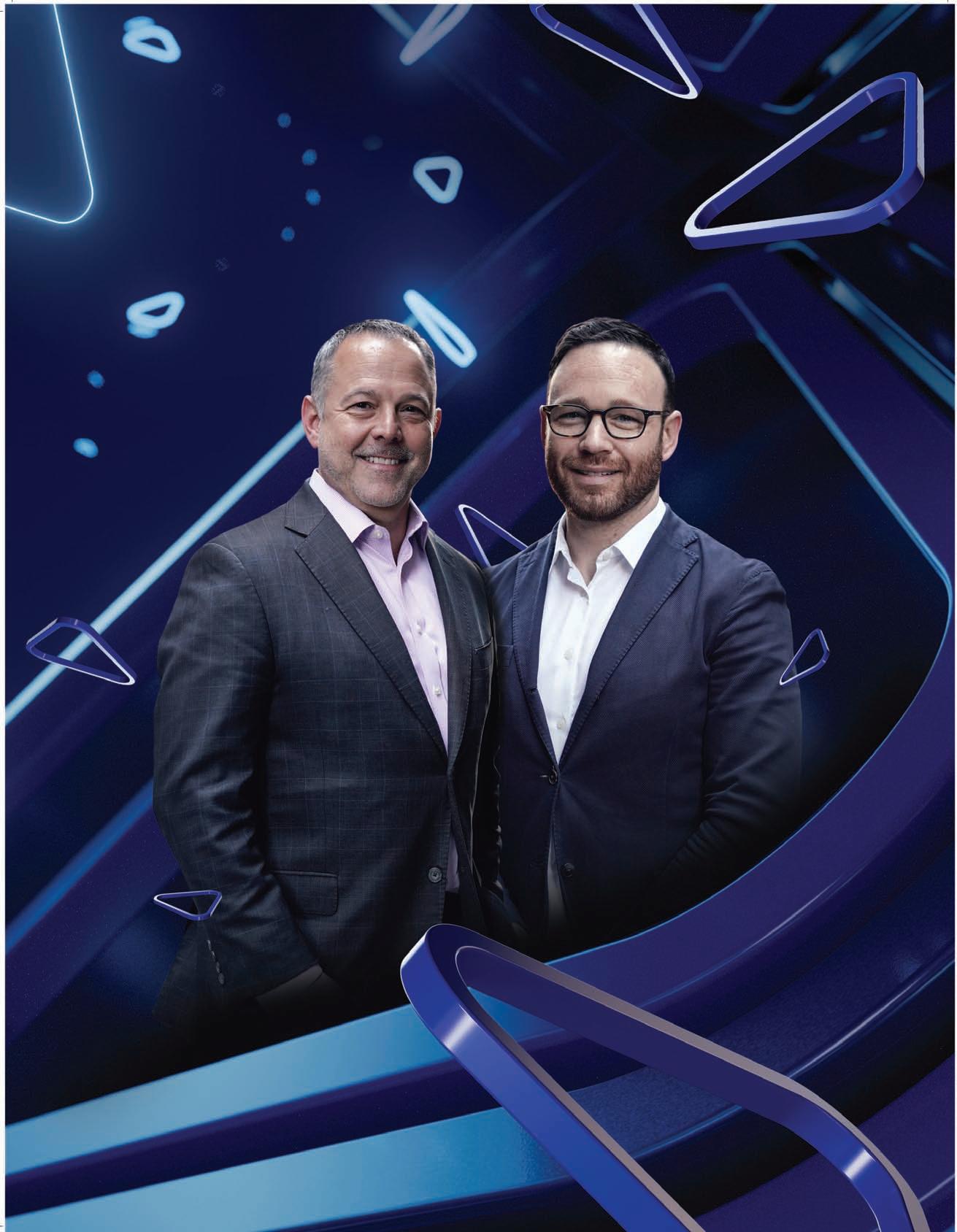
Why gaming can become the next big thing in the Lone Star State


London-based Playtech, one of the most prominent suppliers of online gaming content and software in the world, is on a mission to duplicate its success in European iGaming markets as it expands across the nascent North American online gaming market with its casino, poker, bingo and sports betting products.

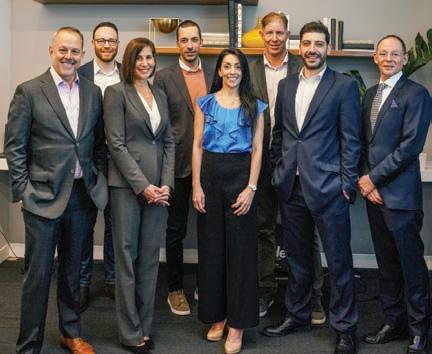
14 Skill Game Conundrum
States with regulated casinos continue to battle the spread of unlicensed, unregulated so-called “skill games” as their manufacturers continue a quest to achieve legitimacy in the U.S.
 By John Brennan
By John Brennan
Proposed changes to U.S. Interior Department rules for taking land into trust could give tribes a more predictable and timely process for establishing gaming on tribal lands.
By Ryan Sawyer and Thomas ZittTired of watching potential gaming revenue flood to neighboring states, Texas lawmakers again embark on an effort to establish casinos in the state, despite the lieutenant governor's opposition.
By David RittvoAs some effects of the Covid-19 crisis continue to linger in the industry, operators look to how the pandemic has permanently changed the way they do business.
By Jess MarquezMicro betting technology and its variety of in-game wagers are changing the way Americans bet on sports.
 By Dave Bontempo
By Dave Bontempo
The fifth annual Eilers & Krejcik Gaming Slot Awards honored a diverse collection of suppliers, again headed by Aristocrat.

 By Frank Legato
By Frank Legato
It was a turning point in my life when I got accepted to dealers school at Caesars Atlantic City back in 1978, although it put on the back burner my goal of becoming a professional musician. That was, after all, kind of a pipe dream, to be honest. I couldn’t read or write music, my band only played varieties of rock or pop songs, but mostly we played original music.
Imagine, if you will, a casino lounge act that in the late ’70s could only play a few Beatles, Stones and CSNY tunes, and the rest would be songs you never heard of before. Yeah, you get the idea.
At the same time, my partner and I had our second son, and supporting them moved to the top of my priority list. Up until then, I used the typical Atlantic City hustle of working your rear-ends off during the summer running a gas dock and collecting unemployment for the winter. It wasn’t a bad life, but it turns out I had some ambition.
Last month, I read a report out of Chicago announcing that Chicago City Colleges would get involved in dealer training for the new Bally’s hotel casino that will rise there over the next several years. That’s what happened with Atlantic Community College. My advice, if you’re at loose ends—take full advantage of it.
Even if you never rise above the level of a dealer, where else could you go to school for free and come out the other end with a $50K-a-year position at least? Chicago seems to be just as interesting as the Philadelphia/South Jersey area is, and I can attest that I met some very interesting people amid some very unique circumstantances.
And that starts with the instructors. Caesars, back in the ’70s, didn’t draft some egghead professors to teach you the games. They employed the people who knew the games the best. And yes, while there were some former dealers from Caesars Palace, most of the teachers came from the illegal gambling towns across the Northeast, South and Midwest.
Take Ramon, for example. He had worked in the Cuban gaming halls of Union City after emigrating from Havana, while his archnemesis Ray came from the Puerto Rican gambling houses on Long Island. Or Big Steve from Stuebenville, Ohio, who loved the phrase “dummy up and deal.” Then there was Mark, a low-key former Caesars dealer, who came to Atlantic City on the promise he’d be
promoted to deal in the corral at Caesars Palace where the tips were the best—and the Rainman played. Took him five years to get back to Vegas.
When I went to dealers school, all dealers had to take blackjack as a first game. I remember asking the casino manager, Jess Lenz, whether I should take a second game, something other than blackjack, that would make me more valuable to the managers. He told me that it wasn’t necessary, that there would be plenty of work for everyone.
He was right. I worked six-day weeks, 10 hours a day, but I was buried in the $2 and $5 blackjack pits every hour of every day. Later when I took baccarat, my life changed again, because I got noticed, because I was needed. And it turned out I was a pretty good dealer, after all.
So it wasn’t only the art of dealing you were learning. You heard all the tall tales and all the horror stories that these vastly experienced instructors could pass out, giving you at least that secondhand knowledge. And you also learned how to groom yourself. Some of us were just out of high school, so the idea of dressing to the nines often came down to the latest fashion in disco or a miniskirt. But since those fashions didn’t cut it in those day with the greatest generation, it was important that non-uniformed executives cut a sharp figure.
For those of us who had that extra ambition, Caesars offered management courses, and to say those classes weren’t much more valuable would be a lie. I never took advantage of those courses in the casino. It seems my big mouth disqualified me from getting promoted, while some of my more reasonable colleagues broke through that ceiling. But what I learned during those years benefited me greatly as I began to write about the industry.
My instructors were excellent. Little did I know that Jess Hinkle was one of the first Native Americans to attain an important role in the business even prior to IGRA. Or that Bill Downey Sr. would pass on to his sons Bill Jr., now a top gaming attorney, and Chris, one of the top slot executives in the country, his expertise. Maybe I would have paid closer attention.
So anyone who thinks that dealer training or free management courses are useless should think again. For those of us who couldn’t afford a bachelor’s or a master’s degree, it might just be the ticket.
Roger Gros, Publisher | rgros@ggbmagazine.com twitter: @GlobalGamingBiz

Frank Legato, Editor | flegato@ggbmagazine.com twitter: @FranklySpeakn
Jess Marquez, Managing Editor jmarquez@ggbmagazine.com
Monica Cooley, Art Director mcooley@ggbmagazine.com
Terri Brady, Sales & Marketing Director tbrady@ggbmagazine.com
Becky Kingman-Gros, Chief Operating Officer bkingros@ggbmagazine.com
Lisa Johnson, Communications Advisor lisa@lisajohnsoncommunications.com twitter: @LisaJohnsonPR
Columnists
Frank Fantini | Dave Forman
Contributing Editors
Rae Berkley | Dave Bontempo twitter: @bontempomedia
John Brennan | Alan Campbell | Keli Elkins David Rittvo | Ryan Sawyer
Bill Sokolic twitter: @downbeachfilm
Thomas Zitt
EDITORIAL ADVISORY BOARD
Rino Armeni, President, Armeni Enterprises
•
Mark A. Birtha, Senior Vice President & General Manager, Hard Rock International
•
Julie Brinkerhoff-Jacobs, President, Lifescapes International
•
Nicholas Casiello Jr., Shareholder, Fox Rothschild
•
Jeffrey Compton, Publisher, CDC E-Reports
twitter: @CDCNewswire
•
Dean Macomber, President, Macomber International, Inc.
•
Stephen Martino, Vice President & Chief Compliance Officer, MGM Resorts International, twitter: @stephenmartino
• Jim Rafferty, President, Rafferty & Associates
• Thomas Reilly, Vice President Systems Sales, Scientific Games
• Michael Soll, President, The Innovation Group
• Katherine Spilde, Executive Director, Sycuan Gaming Institute, San Diego State University, twitter: @kspilde
• Ernie Stevens, Jr., Chairman, National Indian Gaming Association twitter: @NIGA1985
• Roy Student, President, Applied Management Strategies
• David D. Waddell, Partner Regulatory Management Counselors PC
Casino Connection International LLC. 1000 Nevada Way • Suite 204 • Boulder City, NV 89005 702-248-1565 • 702-248-1567 (fax) www.ggbmagazine.com
The views and opinions expressed by the writers and columnists of GLOBAL GAMING BUSINESS are not necessarily the views of the publisher or editor.
Copyright 2023 Global Gaming Business LLC. Boulder City, NV 89005
GLOBAL GAMING BUSINESS is published monthly by Casino Connection International, LLC. Printed in Nevada, USA.

Postmaster: Send Change of Address forms to: 1000 Nevada Way, Suite 204, Boulder City, NV 89005
Publication

With years of attacks on the gaming industry to bolster opinion, it’s no surprise that the majority of British citizens have a negative view of gaming. In a monthly tracker, the YouGovUK website has consistently shown that a vast majority have an unfavorable or very unfavorable view of gaming, while less than 1 percent of respondents have a very favorable view. Contrast this with the U.S.,
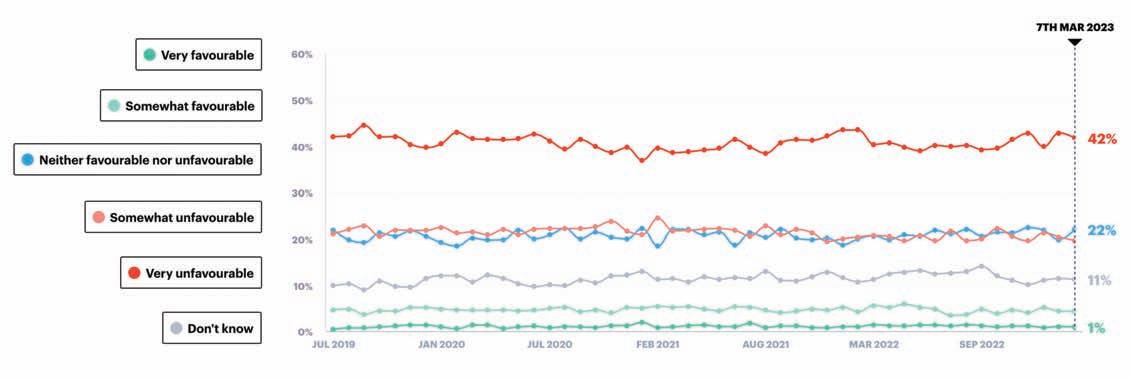
The economic bounceback from the pandemic has been hampered by the reluctance of people to return to their previous jobs. That was particularly evident in the hospitality and retail industries, but things are improving. According to the Nevada Department of Employment, Training and Rehabilitation’s (DETR) January 2023 economic report, the total number of jobs in Nevada has surpassed 1.5 million. Las Vegas employment increased by 4,000 jobs (0.4 percent) since December and saw an increase of 62,600 jobs (6 percent) since January 2022. Reno employment had an increase of 800 jobs (0.3 percent) since December, and an increase of 11,900 jobs (4.6 percent) since January 2022. Nevada’s jobless rate still exceeds the national number.
where the annual State of the States survey by the American Gaming Association shows that at least 50 percent of Americans have a favorable view of gaming. Gaming observers in the U.K., however, say the opinion isn’t in step with reality since studies have consistently shown the problem gambling rate in the U.K. is only 0.2 percent to 0.3 percent.
Unemployment Rate - U.S. and NV January 2023










When Matt Sodl formed Innovation Capital, LLC with principals of The Innovation Group, a boutique investment bank focused on gaming was something new. Now, nearly 20 years later, Innovation Capital has advised on over $11 billion in transaction volume within the gaming, leisure, restaurant and retail industries. Most recently, the company acted as financial advisor to Bally’s in its successful bid for the Chicago casino project. Sodl talks about the current economic climate and why it continues to foster opportunities for tribes and corporations alike. He spoke with GGB Publisher Roger Gros from his offices in Boca Raton in February.

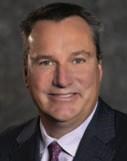
“We continue to believe that we’ve got the project that will open the quickest. We’ll start paying New York the taxes the quickest. It’s in an area that doesn’t need zoning approval.”
—Caesars Entertainment CEO Tom Reeg, on an earnings call, predicting that the operator’s Caesars Palace Times Square project will be the most beneficial to New York City
GGB: You’ve got a couple of earth-shaking deals right now, especially with the Bally’s Chicago deal. How did you accomplish that?
Matt Sodl: We had good fortune to be in some interesting situations over the last couple years in the postCovid era. The Bally’s Chicago project was one where we and Bally’s assembled a great team that put together a very good project, and we were very competitive. Going into it, everyone was telling us there’s an incumbent in that market that is a shoo-in to get the license. But we took a good project together with good people and aligned ourselves with the right constituents and the right piece of real estate. We put a $1.7 billion project together, and kudos to the Bally’s team and Soo Kim for the leadership and creating what is it going be a flagship property for them.
You had another impressive announcement last month as well in Miami. My partner Kevin Scheible was the lead on that project. He was advising the Poarch Band of Creek Indians from Alabama on their acquisition of a Magic City casino in Miami. We just opened an office in Florida a couple of years ago, and it’s nice to get a very large transaction done in the South Florida market. A lot of eyeballs were on that transaction because of because of the Seminoles having a monopoly on the state. But Poarch Creek saw what the opportunity is in the Miami market, and I think what they plan to do with that development opportunity is going to be pretty interesting.
In this current financial environment with a looming recession and high inflation, I would think that would mean making deals would be put on the back burner. But that doesn’t seem to be true. What are you seeing?
It’s a difficult environment to get to get deals done. The financing markets come in and out of favor. It’s a very choppy financial market. So, just when you put a deal like this together—whether it be Bally’s or Magic City—we have to navigate the financial markets. It means that the good transactions, the better projects are going to get done.
M&A activity always seems to happen whether it’s a good times or bad, and especially now in the sports betting field. Is that true?
When you look at the state reports of who the sports betting market share leaders are in the regional markets, it comes down to a handful of companies. There are dozens of new entrants that are trying to get a piece of what is a very small pie because the market share leaders aren’t going anywhere. They’ve built good products, they have cash resources, and they can be very aggressive from a marketing perspective. That means that these new entrants better have a unique twist on a product, or deep pockets behind them.
1 2 3 4 5
In the mainstream casino business, we’ve seen most of the big companies swallow each other up. Is there anything left to consolidate?
That’s a good question. Most of the big deals have gotten done. Caesars has pruned most of their non-core assets off and sold them. I would see perhaps some activity in the lower to mid-cap market. There are a handful of companies out there that have either, whether it be new projects that will put them on the map for some of the larger companies or some of these smaller companies who’ve tried to undertake some pretty large projects and haven’t had the most success. So you could bet that they’re on the radar of some distress companies looking to take advantage of an opportunity there.
April 19-20: East Coast Gaming Congress, Hard Rock Hotel & Casino, Atlantic City, New Jersey. Produced by Spectrum Gaming and Cooper Levenson. For more information, visit eastcoastgamingcongress.com.
April 19-20: SAGSE LATAM 2023, Buenos Aires Hilton, Buenos Aires, Argentina. Produced by Mongraphie. For more information, visit SAGSELATAM.com.
May 9-11: SBC Summit North America, Meadowlands Exposition Center, East Rutherford, New Jersey. Produced by SBC. For more information, visit SBCEvents.com.
May 15-17: Casino Marketing Boot Camp, General Managers Edition, Rolling Hills Casino Resort, Corning, California. Produced by J Carcamo & Associates. For more information, visit CasinoMarketingBootCamp.com.
May 23-25: CasinoBeats Summit (CBS), InterContinental in St. Julian’s, Malta. Produced by SBC. For more information, visit SBCEvents.com.
May 23-25: Gambling & Risk Taking Conference, Park MGM, Las Vegas. Produced by UNLV’s International Gaming Institute. For more information, visit unlv.edu/igi/conference.
May 25-27: Gambling Brasil, Frei Caneca Convention Center, Sao Paulo, Brazil. Produced by Afiliados Brasil. For more information, visit GamblingBrasil.com.
June 13-15: Canadian Gaming Summit, Metro Toronto Convention Centre, Toronto, Ontario, Canada. Produced by the Canadian Gaming Association and SBC. For more information, visit canadiangamingsummit.com.
June 20-23: International Gaming Summit, Culloden Estate and Spa, Belfast, Northern Ireland. Produced by the International Association of Gaming Advisors. For more information, visit TheIAGA.org.
August 8-10: OIGA Conference & Tradeshow, Cox Business Convention Center, Tulsa, Oklahoma. Produced by the Oklahoma Indian Gaming Association. For more information, visit oiga.org/tradeshow.

The commercial gaming industry entered 2023 on the heels of back-toback record revenue years, generating more than $60 billion in 2022. With continued macroeconomic uncertainty likely this year, all eyes in the industry are focused on whether consumers will be able to propel the continued expansion of the commercial gaming market.
January revenue numbers are now in across the country, and it’s clear gaming is off to a quick start in 2023: commercial operators brought in $5.4 billion in gaming revenue in the month, an all-time monthly high.

Here are three key takeaways on the industry’s promising beginning to the year and its outlook for the future.
Combined revenue from land-based casino slot machines and table games across the country reached $3.99 billion in January, marking a 14.3 percent increase from January 2022. Slots generated $2.86 billion in revenue, a 15.5 percent year-over-year increase, while revenue from table games gained 14.7 percent year-over-year, reaching $838 million.
This rise is partially due to the impact the Covid-19 omicron variant had on consumer behavior last January—as well as the launch of two additional commercial casino markets since last January in Virginia and Nebraska. Last year’s favorable comparison aside, this was the highest grossing January in history for the brick-andmortar segment.
While gaming’s expansion to new markets is contributing to growth, so is rising revenue in existing markets. At the state level, 31 of 33 commercial gaming jurisdictions that were operational in January 2022 (and have reported Jan-
uary 2023 revenue figures) posted year-over-year revenue growth.
The only two markets that did not report growth are Washington, D.C. and West Virginia. The sports betting market in Washington, D.C. experienced a decline of 23.8 percent compared to January 2023, likely due to increased competition from Maryland launching online sports betting. Meanwhile, West Virginia revenue declined by 6.3 percent, largely due to one less week of reported operations in January 2023 compared to January 2022.
While in-person gaming remains the bedrock of the gaming industry, the expansion and maturation of complementary verticals is also an important driver of gaming’s momentum.
Fueled by a busy sports calendar and the launch of mobile sports betting in Kansas, Louisiana, Maryland and Ohio (retail and mobile) since January 2022, nationwide sports betting activity—both online and in-person—saw a significant boost, with January wagering handle expected to reach an all-time high of more than
BY DAVE FORMAN$10 billion once all states report their data.
This surge in betting activity resulted in revenue of $922.7 million, a year-over-year increase of 43.3 percent. The Ohio market alone generated gross revenue of $208.9 million in its first month of operation, setting a single-month sports betting record for any state, albeit helped by promotional spending.
Combined January revenue generated by continuing iGaming operations in Connecticut, Delaware, Michigan, New Jersey, Pennsylvania and West Virginia increased by 20.6 percent yearover-year to $482 million, tying the single-month record from December 2022. All six markets reported annual growth for the vertical, with Connecticut, Michigan and New Jersey setting single-month state records for iGaming revenue.
Taken together, the online sports betting and casino gaming segments captured a quarter (24.8 percent) of monthly industry revenue—their largest share since the peak of the Covid-19 pandemic when brick-and-mortar casinos across the country were shuttered.
Ultimately, January’s revenue figures show that gaming is appealing to consumers in new markets but is also still growing its share of con-
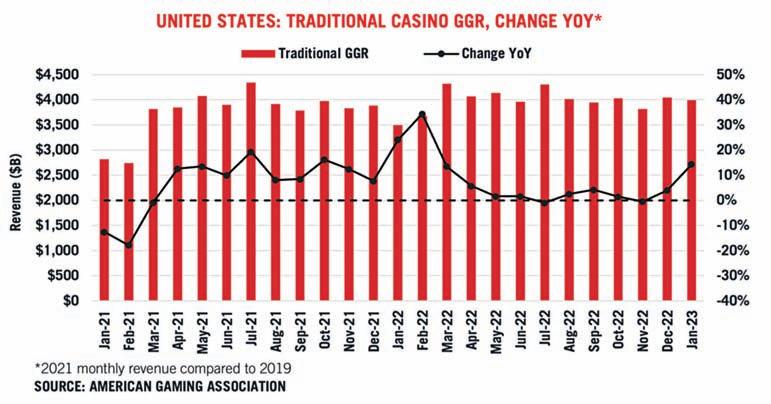
sumer entertainment spending across existing verticals and markets. While we can’t predict how shifting macroeconomic conditions will affect the industry throughout the year, it’s evident gaming’s fundamentals remain solid and the industry’s future remains bright.

The American Gaming Association will continue to track and analyze the commercial gaming sector’s performance throughout the year via our Commercial Gaming Revenue Tracker.

This column was written prior to the release of January 2023 Arizona and Illinois commercial sports betting revenue figures.
Dave Forman is vice president, research for the American Gaming Association.
Afew years ago, we published a research note titled “Nevada Triple Play” extolling the investment virtues of three family-controlled, Nevada-centric gaming companies—Eldorado Resorts, Monarch Casino and Golden Entertainment.
Later, we added a fourth, Full House Resorts, which, while neither a family company nor fully Nevada-focused, possessed many of the same strengths and opportunities. The stocks of all four companies have since soared, providing returns of several hundred percent each.
Since then, Eldorado has purchased Caesars Entertainment and changed its name to Caesars. Monarch and Golden have achieved much of the business potential we saw for them. Full House is still to play out.
So where do we stand on those companies today? We are still with them, though for reasons that vary as the businesses have changed, and recognizing that the returns of the past several years are unlikely to repeat for most over the next several. Here’s a fresh look at the quartet:
• Caesars has undergone the greatest transformation from its much, much smaller Reno beginnings.
The investment thesis: The same steadfast family control, a CEO in Tom Reeg focused perhaps like no other in the industry on the bottom line, and the potential of all of its large and varied assets—Las Vegas Strip resorts, regional casino network and 60 million-plus player database upon which to build a highly profitable online gaming and sports betting operation.
Given the prospect of generating EBITDAR approaching $5 billion in several years and an ever-improving balance sheet, it is likely that the stock will double in a reasonable amount of time from its recent $40 to $55 range, and then perhaps far more in the long-term.
Caesars sound bite: Size matters.
• Golden. With the sales this year of its Maryland casino and its slot routes business, Golden will become a pure play on the growth of southern Nevada.
The investor focus is on development of the
Strat in Las Vegas into a casino resort matching the revenue and profitability of would-be Strip peers like Circus Circus, Luxor and Excalibur, expanding the Las Vegas Valley tavern business to its stated goal of up to 100 units from today’s 64, developing its dominant Laughlin presence into a profitable and growing Las Vegas alternative and LV residents’ getaway, and maximizing returns of its locals casinos.
Achieving that should lift the stock from its recent $40-plus range to $60 or so, and even to near $80 if Golden receives the valuation multiples commensurate with its significant free cash flow and physical assets.
But in simplifying its business and generating more than $500 million from its Maryland and route sales, Golden has opened other possibilities.
The company will be positioned to grow. That could come through casino acquisitions. But it also could come in unconventional ways, such as extending the highly profitable tavern business (EBITDA exceeding $500,000 per unit) to other states, perhaps in partnership with Illinois-based J&J Ventures, which is buying its route business.
Golden could become an acquisition candidate itself. CEO and principal shareholder Blake Sartini was COO of Red Rock Resorts, whose chief shareholders, his brothers-in-law Frank and Lorenzo Fertitta, want to make their locals casino empire hyperlocal, including tavern development. Then again, a merger with another mid-size operator facing the same issues, say Monarch Casino, could make sense.
Finally, and perhaps most likely, Golden becomes a low-debt cash-generating machine returning capital to shareholders with special and recurring dividends and stock repurchases while Sartini and President-CFO Charles Protell search out expansion opportunities.
Golden sound bite: Optionality.
• Monarch Casino has come closest to achieving the potential we saw for it in Nevada Triple Play. While the stock might add another $10 or $20 or even $30 to its current $70s range, another fourbagger is unlikely.
And though CEO John Farahi is on the hunt
BY FRANK FANTINIfor an acquisition, one wonders if the uber-prudent businessman can find a property to match the mature Atlantis in Reno and soon-to-mature Monarch in Black Hawk, Colorado.
Aside from such an acquisition, the question is where the family-controlled company goes from here, especially with the Farahi brothers in their 70s. One possible answer is that John’s son Dan grows into greater responsibility. Another is that son and former COO David returns to take the helm.
For now, the debt-free company is sharing its growing mountain of cash with shareholders. Monarch recently announced a $5 a share special dividend and 30 cents-a-share quarterly dividend. Further dividend growth appears likely as the mountain rises.
One thing we know, John Farahi is an exceptional operations CEO and a man of utmost integrity and purpose. He will find the best route for shareholders.
Monarch sound bite: Free cash flow machine.
Full House Resorts reported disappointing fourth quarter earnings that caused the stock to sell off. Our response: Thank goodness. We were able to buy a few more shares at what should prove to be bargain prices.
The fourth quarter has virtually nothing to do with its outlook.
• Full House has new properties this year in Chicagoland and Cripple Creek, Colorado, that will triple the legacy $40 million or so in EBITDA in the foreseeable future and probably quadruple it over time.
Most analysts have target prices of $13 or $14 on the stock recently selling around $8. They are being conservative. A price of $20 in a year or so is more likely. And given the same valuation as peers, $25 and even $30 is credible in time. By then, always-imaginative CEO Dan Lee and his experienced management team are sure to have found new growth opportunities to pursue.
Full House sound bite: Growth, baby!
Frank Fantini is principal at Fantini Advisors, investors and consultants with a focus on gaming.

Eldorado, Monarch, Golden and Full House would have been good stock choices—if you listened
Gold Member Profile
Everi
everi.com
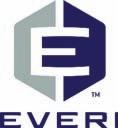
Everi is a leading supplier of imaginative entertainment and trusted technology solutions for the casino, digital and gaming industry. With a focus on both customers and players, Everi develops entertaining games and gaming machines, gaming systems and services, while also providing core financial products and services, player loyalty tools and applications, and intelligence and regulatory compliance solutions.
Bronze Member Profile
Euro Games Technology Ltd.
egt-bg.com
Euro Games Technology (EGT) is a global gaming manufacturer with headquarters in Bulgaria and representative offices in Europe, Africa, Asia and North, Central and South America. Apart from its core slot business, EGT’s portfolio includes casino management and VLT systems, EGT multi-player, and EGT digital, focused on all online gaming verticals.
Associate Member Profile
CDC Gaming Reports
cdcgamingreports.com
Since 2002, CDC Gaming Reports has been one of the industry’s premier news, commentary and analysis sources. With team members in eight U.S. states and the United Kingdom, and a close operational partnership with Inside Asian Gaming, CDC Gaming Reports brings the world of gambling to the industry’s professionals.
AGEM is an international trade association representing manufacturers of electronic gaming devices, systems, lotteries and components for the gaming industry. The association works to further the interests of gaming equipment manufacturers throughout the world. Through political action, trade show partnerships, information dissemination and good corporate citizenship, the members of AGEM work together to create benefits for every company within the organization. Together, AGEM and its member organizations have assisted regulatory commissions and participated in the legislative process to solve problems and create a positive business environment.

• The new chairman of the Nevada Gaming Control Board, Kirk Hendrick, hosted a workshop meeting on March 21, to discuss modernization of Nevada’s regulatory oversight of gaming technology. This informal dialogue was designed to gather information from industry representatives highlighting experiences and practices in other gaming regions. AGEM Executive Director Daron Dorsey attended the workshop and shared a general synopsis and recommendations gathered through feedback from the membership.
• AGEM aims to continue pursuing discussions with the Pennsylvania Gaming Control Board to improve approval procedures and processes for getting land-based and online gaming products into that market. It appears that there is consensus that common ground can be found to speed up timelines, as well as working with the agency to improve general procedures going forward, so AGEM will continue the efforts on behalf of the membership.
• Some months ago, AGEM commissioned an Industry Impact Analysis and Report which provides an extensive overview into the supplier sector, both in the U.S. and globally. Members were informed at the March meeting that the report is complete and will be distributed to the membership in the coming weeks. This important study has been commissioned by AGEM several times over the years, and highlights the benefits the industry brings to communities through job creation, wage growth and general improvements to society. The latest version shows the supplier sector has been resilient over the past three years through the pandemic and that recovery and growth continue throughout the gaming supplier sector.
• A new plan for AGEM meetings and events was unveiled to the membership at the March meeting. During the pandemic, the need to switch to virtual meetings highlighted how accessible and successful the gatherings could be. Since that time, more and more members have chosen to stay “virtual,” so from April onward, the usual monthly gatherings will be held via Zoom. One of AGEM’s strengths. however, is to provide a good arena for people to get together to share information and network, so going forward, in-person events will be held every three to four months. These will consist of a variety of formats featuring key speakers or panel discussions, highlighting companies or services that are industry-related, possibly followed by a lunch or dinner or reception. More detailed plans and objectives will be shared at the next meeting that will provide a more interactive and beneficial forum for members in the long term.
• The Indian Gaming Association Trade Show and Convention took place March 27-30 at the San Diego Convention Center. AGEM’s Dorsey and President Bob Parente attended a presentation prior to the show consisting of a dedicated sponsorship towards tribal educational initiatives. This philanthropic support marks a new direction for AGEM, focusing more on educational initiatives rather than commercial ones.
The AGEM Index decreased by 1.51 points in February 2023 to 950.91, a 0.2 percent decrease from the prior month. Compared to one year ago, the index was down 2.04 points, or 0.2 percent. During the latest month, six of the 12 AGEM Index companies reported stock price increases, which resulted in five positive contributions to the AGEM Index and seven negative contributions. The largest positive contribution to the monthly index was sourced to Aristocrat Leisure Limited (ASX: ALL), whose 7.6 percent increase in stock price led to a 9.27-point gain to the index. Additionally, Crane Co. (NYSE: CR) saw its stock price increase by 3.3 percent, leading to a 4.76-point gain to the index. The largest negative contribution to the index was sourced to Konami Corp. (TYO: 9766), whose 5.7 percent decrease in stock price resulted in a 12.48-point loss for the AGEM Index. All three major U.S. stock indices saw month-over-month decreases in February 2023. The Dow Jones Industrial Average decreased by 4.2 percent from the prior month, while the S&P 500 fell by 2.5 percent. Meanwhile, the NASDAQ dipped by 0.9 percent from January.

The American Gaming Association represents numerous companies that run legal gambling businesses in the U.S., including casinos.




In a comprehensive report issued last fall, the headline on AGA’s website noted that “Americans gamble more than half a trillion dollars illegally each year.” That includes $337.9 million in illegal online casino play and $63.8 billion at illegal sportsbooks—most of them online and based in foreign countries.
But the third category—at $109.2 billion—is described not as “illegal machines” but “unregulated machines.”

Why is that? The answer is complicated.


OK, very complicated.
That’s because a significant part of that $109.2 billion includes so-called “skill games” machines that look superficially like slot machines, but which include player options that can improve their chances of winning. Is that illegal?
Almost certainly so in some states, definitely not in others—and the status is murky in still others, all depending on the state’s specific gaming regulations and laws. A number of states feature lawmakers, regulators and law enforcement officials doing what they can to outlaw these games—in large part to protect the interests of regulated gambling outfits such as casinos, horse racing tracks and state lotteries.
But in Pennsylvania, such efforts have been unsuccessful because the state’s laws are too vague on the issue. Yet in Virginia, a 2021 law passed that explicitly outlaws the machines may prove to be too specific. “It is a bit of a Goldilocks problem,” says Chris Cylke, AGA senior vice president of government relations, in terms of figuring out exactly how to outlaw such machines if a state is so inclined.
But for Michael Barley, the chief public affairs officer for leading skill
games supplier Pace-O-Matic, there’s no reason for there to be an issue at all. He says the solution is to enact legislation that permits and regulates the games.
“When has a regulatory ban ever worked?” asks Barley, whose machines are present in 11 states. “We tried Prohibition, and that didn’t work. Why not just regulate and tax us?”
But Cylke counters that “people in the gray machines market just try to obfuscate the fact of what the games really are, and they gum up the works with political contributions. It’s a weak argument.”
The company stance is that it wants to see Pennsylvania in particular join a handful of jurisdictions such as Wyoming, Georgia and Washington, D.C. in formally regulating their machines. In fact, three Keystone legislators have sponsored a bill to do just that.
The legal battle in Pennsylvania dates back even before a 2014 court ruling that found that the state’s gaming laws do not permit oversight of skill-based games by regulators. A 2019 ruling further emphasized that point, making it apparent that it would take passage of a new, more specific law to change the status quo.
“The Gaming Act was intended to license slot machine operations at racetracks, casinos, hotels, and established resort hotels,” the Commonwealth’s Court ruling read. “The Pace-O-Matic games are not located at any of these types of facilities and there is absolutely no suggestion... that the Gaming Act was intended to apply to the facilities where the games are located, e.g., taverns and social clubs, or that the Gaming Act regulates the placement of slot machines at such facilities.”
And in May 2022 and in February 2023, Pace-O-Matic prevailed once again as Pennsylvania judges in two different counties ruled that the

States with casinos continue to battle unregulated “skill games,” and gaming associations continue to seek their ban, even as a few states begin to regulate and tax the slot-like games
company’s machines had been seized illegally in raids.
In Virginia, a back-and-forth on the wisdom of permitting the games led to a law that places an absolute ban on “skill games.”
But what is a skill game, anyway? Even expert poker and blackjack players, if pressed on whether those games were based on skill or luck, likely would simply answer “yes.” Both elements definitely apply.
State regulations tend to break down the “skill vs. luck” gambling issue into one of three directions.
One is whether skill is the “predominant” factor in whether a player is successful. Another is the “material element test” regarding whether chance plays a significant role in the result. The least common is the “any chance test,” which basically finds that if there is any luck involved, it constitutes illegal gambling.
The AGA has simplified this seeming conundrum, coming out against any activity where money is risked but which does not feature legal oversight. From the report:
“These unregulated machines look and act just like the slot machines found in a casino, but operate instead in unlicensed environments like bars, taverns, convenience stores and gas stations, where they prey on vulnerable consumers, including minors. Additionally, the lack of regulatory controls increases the risks they may be tied to criminal activity including money laundering, drug trafficking and violent crime.
“State lawmakers and regulators must take action to strengthen and enforce laws protecting consumers from these machines that often lure players in under the guise of being ‘games of skill.’”
But Barley disputes that characterization of his games, a popular version of which resembles a tic-tac-toe board where a player might have 30 seconds to choose which of the nine symbols on the screen to convert to “wild.” The shrewdest move would be to add the wild symbol in a slot that produces the equivalent of three consecutive matching symbols—and thus a winning result.
Pattern recognition and memory recognition skills also come into play with many games, so someone particularly adept and focused will “beat the house”—to use a gambling term—over and over, to the tune of about a 5 percent profit.
“In our games, you can win every single time. It just depends on how

you play it and if you’re a skillful, patient player,” Barley has said. “There are players that don’t put in such effort, and that’s their choice.”
Further muddying the waters is the fact that the AGA does not offer a stance on the legitimacy of “historical horse racing machines,” which quite similarly could involve the use of some skill by a player, but often do not.
Barley also notes that the reason many legislators are loathe to completely crack down on the machines is that in many cases they provide much-needed revenue for local charitable organizations. Three Pennsylvania lawmakers—state Senator Gene Yaw and state Reps. Jeff Wheeland and Danilo Burgos—in late 2021 announced plans for legislation, dubbed the “Skill Gaming Act,” that will regulate and tax such games at 16 percent of gross profits.
That bill has faced its own host of detractors, however, including operators of casinos, the Pennsylvania State Police, and former Governor Tom Wolf.
Barley also points to the company’s self-regulation efforts, such as hiring of a team of former Pennsylvania state police officers to enforce codes of conduct. That includes ensuring that the machines are not located in such an abundance in any one place that they effectively create “mini-casinos.”

He adds that the casino visitor is not similar to a visitor to a local store or tavern, who enters the door for other reasons but might spend a little extra time there to try to make a little money on one of the machines.

“They’re just two different customer bases,” Barley says.
In Virginia, House Majority Leader Terry Kilgore tried and failed in February to pass a bill legalizing skill-based games.
The state’s General Assembly had voted in 2020 to ban the machines, around the same time that the state legalized construction of casinos for the first time. But then-Governor Ralph Northam in 2021 backed a one-year
“In our games, you can win every single time. It just depends on how you play it and if you’re a skillful, patient player. There are players that don’t put in such effort, and that’s their choice.”
—Michael Barley, Chief Public Affairs Officer, Pace-O-MaticPace-O-Matic’s Dragon’s Ascent is a game focused on skill rather than chance, according to the ruling in D.C. which determined how the game fit into their standing gambling laws
delay in the ban due to economic pressures created by Covid-based shutdowns of many businesses.
An effort to declare the ban unconstitutional led to a Virginia judge issuing an injunction to block enforcement of the ban in December 2021, and the legality of the machines has been unclear ever since.
“The reach of the new law is enormous,” wrote gaming law expert I. Nelson Rose, a professor emeritus at California’s Whittier College, in support of a scrapping of the ban. “Virtually every game, both in the real world and online, would be outlawed.”
Lawmakers in numerous states have been lobbied on this debate to the tune of millions of dollars both by companies such as Pace-O-Matic and by regulated operators such as casinos and racetracks. That seems to be a major reason for the lack of consistency in support of either regulating or banning the machines—with the usual partisan political divide not being evident on the issue.
The Virginia Public Access Project concluded that Pace-O-Matic has donated nearly $1 million to political candidates in Virginia, with nearly an even split among Republicans and Democrats.
The extent of the division among lawmakers was underscored by a vote in the Kentucky House in early March in which 42 members opposed a bill to formally ban skill game machines, 35 supported it, and 23 members abstained.
That vote came just a day after a House committee had advanced the bill by a 13-7 vote. A separate bill would legalize the games under the oversight of a newly created Kentucky Gaming Commission, with truck stops permitted to have as many as 10 skill games and other businesses limited to a maximum of five.

Still, the two houses came together in mid-March and soundly defeated the skill-based machines by a margin of 64-32 in the House and 29-6 in the Senate. Pace-O-Matic spent over $135,000 on the campaign, compared with more than $800,000 by horse racing interests, according to the Kentucky Legislative Ethics Commission in 2022.
Some other states were also running campaigns that would eliminate the issue of skill games.
On one side, a joint federal and state investigation in South Carolina—where only the lottery, raffles and bingo are considered legal gambling—in December 2022 seized more than $1 million related to distribution of machines where a player can insert cash and attempt to
in
“shoot digital fish.” Such devices clearly are illegal in that state.
That raid was followed a month later by a letter sent by the AGA to the U.S. Attorneys in each state urging further action on such machines. The letter points to the “Johnson Act,” a federal law that prohibits the manufacture and sale of any “gambling device” unless a state or locality has enacted legislation specifically exempting a product from that law. That could have impact in states with no formal conclusions on skill machines, such as Pennsylvania or Virginia.
In New Jersey, the second state in the U.S. to legalize casino gambling in 1976 — and the source of the six-year legal battle to allow all state lawmakers to make their own decisions on sports betting that ended in success with a 2018 U.S. Supreme Court ruling—a spokesman for the Attorney General’s Office said that “determinations on what constitutes contests of skill are both narrow and fact-specific, such as baking or photography contests where the winner or winners are selected by a panel of judges who are using uniform criteria to assess the quality of entries.”
But Wyoming legislators in 2021 formally endorsed the Pace-O-Matic products as legal games of skill that depend primarily on a player’s skill, not on mere chance.
The Wyoming law that ended the controversy there led Pace-O-Matic executives in the summer of 2022 to invite five key Pennsylvania lawmakers to what in at least one case was an all-expenses-paid visit to the Cowboy State to meet with their legislative counterparts and hear why the legalization was approved.
While there, the guests attended what is described as “the world’s largest outdoor rodeo.” Pennsylvania’s legislative ethics laws do not prohibit such trips, even if a lobbyist pays for them.
According to Spotlightpa.org, a political action committee associated with the skill machine games industry contributed more than $1 million to elected officials from 2019 to 2022.
Opponents of skill games legalization are no less shy about lobbying lawmakers. The same news organization found that a 2019 bill proposing a ban on the games was in large part ghostwritten by executives for Parx casino, the state’s leader in that industry.
Coincidentally or not, the stalemate in Pennsylvania and elsewhere continues. And while Pace-O-Matic officials endorse legislation to regulate and tax the machines, the status quo arguably benefits them even more.
“These unregulated machines look and act just like the slot machines found in a casino, but operate instead
unlicensed environments like bars, taverns, convenience stores and gas stations. State lawmakers and regulators must take action to strengthen and enforce laws protecting consumers from these machines that often lure players in under the guise of being ‘games of skill.’”
—AGA


Playtech was established by Israeli entrepreneur Teddy Sagi in 1999 and has grown to become one of Europe’s most notable names in iGaming, with its software being utilized by a raft of prominent operators including the likes of Ladbrokes, William Hill and Bet365.


The firm’s innovations today run to an ample selection of web and mobile-based digital gaming applications that encompass everything from casino, poker and bingo entertainment to live-dealer and sports betting.
The London-based company released its first casino product in 2001 before going on to inaugurate its highly successful iPoker network some three years later. This was followed in March 2006 by its floatation on the London Stock Exchange with a valuation just shy of $1 billion and the subsequent appointment of former Oracle and PricewaterhouseCoopers professional Mor Weizer as chief executive officer.
The promotion of Weizer saw Playtech further ramp up its efforts at developing best-in-class gaming products and content that encompassed strong partnerships with a large number of iGaming licensees as well as the acquisition of multiple smaller software operators and developers. These endeavors resulted in rapid expansion to give the innovative company a presence in just about every corner of Europe’s flourishing online gambling industry.
“Playtech was established at the inception of the online gambling industry, and its offering has been developed with over 20 years of investment and experience in the iGaming sector,” says Weizer.
The firm highlighted quality and flexibility as other important factors in its growing success with the modular capacity offered by its Information Management Solution (IMS) platform serving as a prime example of these differentiators.
This cutting-edge advance provides licensees with all of the tools necessary to successfully manage and run an iGaming operation, while its modular construction means that distinct capabilities can be broken down into a set of easily identifiable services with distinct integrations for the more agile delivery of technology.
For iGaming operators with their own platforms, Playtech furthermore offers a software-as-a-service (SAAS) proposition for access to its vast range of innovative content. The company revealed that this plug-and-play advance gives licensees the chance to benefit from its entertainment while simultaneously taking advantage of low implementation costs and quick times to market.
Adding to its offer, Playtech runs a structured agreement model for partners who may lack the necessary technological expertise to succeed online despite having a strong retail brand. This configuration comes complete with a platform-based solution alongside a range of marketing and operational services, and has already been successfully rolled out with the state-owned
“Our mission has always been to empower our customers and partners to be successful. This continues today via our ‘source of success’ motto while delivering shared and long-term value for all of our stakeholders.”
Mor Weizer, Chief Executive Officer, Playtech
Holland Casino in the Netherlands in addition to a number of iGaming operators in Latin America.
Playtech disclosed that its forward-thinking data analytics offering is furthermore helping iGaming operators to improve player experiences and increase lifetime values. The firm asserts that this overture gives licensees all of the tools they may need to effectively evaluate “big data” and leverage real-time automated insights into players’ behavioral patterns so as to create a personalized gaming experience.
Playtech today possesses a premium listing on the London bourse’s respected main market while moreover sitting as an established member of the equally impressive FTSE 250 Index. With offices in 20 countries, the company has 180 partners operating in more than 40 regulated jurisdictions, and recently recorded adjusted EBITDA for the six months to the end of June 2022 of nearly $217 million, which equated to an increase of 64 percent year-on-year, driven almost entirely by online growth.

The firm described its initial float as “a significant milestone” that allowed it to begin raising capital to



pursue “an ambitious growth plan” that continues to be aimed at a multitude of regulated and soon-to-beregulated markets across the globe, including those in the United States, Canada and Latin America.

“Our mission has always been to empower our customers and partners to be successful,” says Weizer. “This continues today via our ‘source of success’ motto while delivering shared and long-term value for all of our stakeholders.”
With experience in the fields of online gambling, technology and finance, Weizer says he is now focused on continuing to discover ways for Playtech to “grow and innovate,” even as the world continues to come to terms with the war in Ukraine and the lingering impacts of the coronavirus pandemic.

“I have an unwavering and steadfast commitment to safeguarding our people and their families,” says Weizer. “I also have an ambition for this business to have a positive impact on people, communities, the environment and the wider industry.
“As such, we have established our five-year sustainability strategy with commitments and targets covering safer gambling, climate and diversity and
With offices in 20 countries, the company has 180 partners operating in more than 40 regulated jurisdictions, and recently recorded adjusted EBITDA for the six months to the end of June 2022 of nearly $217 million, which equated to an increase of 64 percent year-on-year, driven almost entirely by online growth.
inclusion alongside a broader contribution to the communities in which we operate.”
As part of this strategy, Playtech has detailed that it is committed to investing in responsible gambling technologies to build a safer and sustainable industry. This effort has so far included the 2017 acquisition of responsible gambling analytics solution provider Betbuddy alongside the integration of safer gambling solutions into the company’s IMS platform.
Playtech entered the budding iGaming market of the United States in Q3 2020 via its Playtech USA arm. The company initially followed a content-first approach by exploiting existing relationships to launch with New Jersey’s BetMGM, Party Gaming and Borgata brands before subsequently rolling out its online casino software in the Garden State with Bet365.
Weizer says the strict regulatory regime attached to New Jersey’s iGaming environment presented its teams with the “perfect litmus test,” as its initial expansion phase encompassed a focus on entering as many states where iGaming is legal before going on to grow its market share.
Playtech has since secured multi-product relationships with the likes of Parx Casino, 888 and Pokerstars, and is now licensed in eight American states, including Ohio, where it recently introduced a range of Class C retail sports betting kiosks via a partnership with Gold Rush Gaming.
Playtech’s American presence furthermore stretches to content and live-dealer studios for iGaming domains in Michigan as well as New Jersey, where the BetParx service is utilizing its IMS platform. The company noted that “further live facilities are progressing in Pennsylvania among other locations and where iGaming is most popular,” while it has recently grown its local operational and backoffice teams “in order to accelerate its presence in the region.”
The company admits that it entered the U.S. iGaming market later than many other European firms, but nevertheless believes that its success will be assured by the wide range of high-quality technology and capabilities it offers. It describes this portfolio as instrumental, as it looks to accelerate market penetration and deliver compelling and entertaining experiences that will simultaneously help partners to grow their businesses responsibly.

In Canada, Playtech describes the province of Ontario as “an exciting new iGaming environment” where the regulatory framework has been designed to maintain high standards across a number of areas including responsible gambling.
The firm inked a wide-ranging software and services agreement with NorthStar Gaming in December 2021 before going on to extend this relationship so as to allow the Toronto-headquartered operator to utilize its Playtech Protect advance alongside its live-dealer, poker, bingo and casino innovations.
When it comes to what is popular in the nascent iGaming market of North America, Playtech asserts that while sports betting states continue to outnumber iGaming compatriots five-to-one, official state reports surprisingly reveal that igaming accounts for some 40 percent of aggregated online and sports betting GGR in the U.S.
Playtech now employs over 130 people in the United States, and declares that it is “well-placed to serve and support the needs of American iGaming clients” across a wide range of critical areas from sales and information technology to project management and compliance.
Playtech also has noted it will only seek to deploy its retail sports betting technology “where and when this is financially and strategically viable.”
When it comes to what would constitute success for Playtech in the U.S. and Canada, it is intent on “replicating its success by becoming a leading supplier in the Americas” and “securing a significant market share” as well as a “presence in all states where iGaming is legal and competitive.”
The firm furthermore notes that it is consequently hoping to develop even more strategic projects that will help it to open up new revenue streams and further increase its standing while deploying safer gambling technologies and its “almost unparalleled library of top games” to a large club of American and Canadian partners.
“Our team’s depth and breadth of expertise forms the foundation for delivering the quality technology, must-have engaging content and reliable service that will make us a partner of choice as we expand across the United States and Canada,” says Weizer.

When it comes to what is popular in the nascent iGaming market of North America, Playtech asserts that while sports betting states continue to outnumber iGaming compatriots five-to-one, official state reports surprisingly reveal that igaming accounts for some 40 percent of aggregated online and sports betting GGR in the U.S.



Jerry Kadir joined Playtech USA some 15 months ago after nearly 18 years with Gaming Laboratories International (GLI), and he is now focused on delivering Playtech’s wide range of content to its growing list of American and Canadian clients. Kadir has a large amount of experience in the world of gaming, having previously worked across numerous states and managed multiple projects for a plethora of suppliers.
Playtech states that Kadir moreover has a detailed understanding of different regulatory agencies and the world of compliance alongside an in-depth knowledge of many casino products. The New Jersey-based professional expresses his belief that “customer satisfaction is the primary key to a successful business,” and that he looks to aid this process by “delivering what customers want on time without sacrificing quality.”
Looking ahead, Kadir says he is excited to be launching casino and live-dealer products from Playtech to partners in the United States and Canada, so as to drive the company’s expansion and further develop its relationships with licensees and operators.
Charly Jackson is responsible for managing Playtech
USA’s live-dealer studio in Michigan while additionally coordinating travel for all of the company’s American employees. Alongside these duties, the enthusiastic Southfield-headquartered figure is tasked with assisting in the design and production of the uniforms worn by all of the company’s customer-facing staff in the Wolverine State.
Before joining the ranks of Playtech USA in July 2021, Jackson worked as a customer service representative for a firm in the logistics sector. Although this post represents her first in the world of iGaming, the former teacher admits to being thrilled with an immersion in the culture of gaming and Playtech.




“We have exciting new offerings for our licensees based in the United States, such as our Fireblaze series, and I am excited for new licensees to join us as we showcase new games and tables for our American partners,” says Jackson.
With nearly a decade of experience in the iGaming sector, Gia Reece serves as the operations manager for Playtech USA’s live-dealer studio in Michigan. Reece joined the company’s ranks in March 2021 to help it build a first American live-dealer studio in New Jersey before being tasked with helping the firm to secure regulatory approval for its games and tables from the Michigan Gaming Control Board.
Reece says she is “proud to have been an essential part” of the team that brought Playtech live-dealer gaming to the American market, and is now looking forward to “contributing significantly to the growth and success” of her company’s Michigan endeavor. She furthermore expresses excitement at Playtech USA’s future prospects in the United States, and is now dedicated to “tirelessly working to create unique games that will provide an engaging entertainment experience.”
With a decade of experience in the gaming industry covering a range of information technology, field operations and sales engineer roles, Chris Applegate now serves as a customer success director for Playtech USA.

Las Vegas-headquartered Applegate held a senior technical role with online gaming software supplier GAN Limited before joining Playtech in January 2022. He says iGaming is “the next big step” in his career. He is now responsible for managing Playtech USA’s BetParx accounts in Pennsylvania, New Jersey, Michigan and Ohio while simultaneously handling its retail sports betting kiosk accounts in the Buckeye State with Gold Rush Gaming.
“I feel like I have finally found a home with Playtech USA,” says Applegate. “I am excited about what we have accomplished in the first year, including the launch of live-dealer solutions in multiple states and a state-of-the-art sports betting solution in Ohio. We have some exciting solutions planned, and I look forward to introducing these solutions in the near future.”







 By Ryan Sawyer and Thomas Zitt
By Ryan Sawyer and Thomas Zitt
On March 1, the comment period closed on proposed revisions to two sets of regulations regarding development in Indian Country.
Under the leadership of Secretary Deb Haaland, the Department of the Interior is attempting to reform the process for acquiring lands into federal trust status for Native American tribes and individuals, commonly known as “fee-to-trust” or “FTT,” and on a parallel track, to rationalize and codify the rules that govern Class III compacts.
In this article, we focus on the proposed changes to the FTT process.

The acquisition of lands-in-trust status for Native American tribes is governed by the Indian Reorganization Act of 1934, with regulations codified at 25 Code of Federal Regulations Section 151, known colloquially as the 151 Regulations.
Proposed changes to the 151 Regulations could lead to a more predictable, impartial, efficient and timely process for tribal governments seeking to establish or expand their land base for economic development purposes, including new gaming developments.

To be eligible for gaming, newly acquired trust lands must meet certain criteria outlined in Section 20 of the Indian Gaming Regulatory Act (IGRA) of 1988. IGRA prohibits gaming on trust lands acquired after October 17, 1988 (the date IGRA was enacted), but allows for several “exceptions.” These exceptions are described fully in 25 CFR Section 2719, and generally include:
1. If the land was within or contiguous to the boundaries of the tribe’s reservation on October 17, 1988 (or the tribe’s last recognized reservation);
2. If the land is acquired into trust as part of the settlement of a land claim;
3. If the land is acquired into trust as the initial reservation for a tribe acknowledged by the secretary under the federal acknowledgment process;
4. If the lands qualify as “restored lands” for a tribe that is restored to federal recognition; or,
5. If the secretary issues a “Two-Part Determination” that gaming activities would be (1) in the best interest of the applicant tribe, and (2) not detrimental to the surrounding community; and the state’s governor concurs in the determination.

Under exceptions 1- 4, the tribe must request an Indian Lands Opinion from the Office of Indian Gaming to verify that the lands would qualify for gaming under IGRA. Many, if not most, of the pending applications for gaming-related trust acquisitions today involve exception 5 (two-part determination), meaning they will ultimately require approval by the state’s governor in addition to Interior. There are no proposed federal amendments or revisions to the federal process for determining gaming eligibility under IGRA.
After consultation with tribes earlier in 2022, the Office of the Assistant Secretary for Indian Affairs published the draft regulations (outlined in 25 CFR Part 151) last December. It is expected that the final regulations may be published later this year, perhaps as early as May or June, although no official release date has been announced. While the final rule may be revised pending the outcome of further tribal consultation and public comment, the draft rule contains significant substantive and process-related

changes. To remove obstacles that tribes and individual Native Americans have faced in the trust acquisition process, Interior has added new definitions, clarified requirements that have been common practices, and made other minor changes throughout the rule.
The proposed rule classifies four different forms of acquisitions—on-reservation, contiguous to reservation, off-reservation, and initial Indian acquisitions—with the last being a new fourth category designed to ease the process for those tribes that do not currently possess any land in trust. Requirements vary for each category, and the application process is more streamlined, as discussed below.
While the “purpose” of a tribal government’s acquisition must still be identified, the Bureau of Indian Affairs (BIA) would no longer be required to consider its “need.” It will now be presumed, based on decades of BIA experience in acquiring and administering trust lands, that the tribal community will benefit from the acquisition. This change would apply to all categories, saving tribes the cost and time of documenting why they “need” the acquisition (sorry, consultants).
For on-reservation acquisitions, the requirement to consult state and local governments is eliminated. However, for acquisitions of contiguous land, state and local governments will continue to have a 30-day period to submit comments regarding impacts on regulatory jurisdiction, real property taxes and special assessments. If no comments are submitted, there will be no need for the secretary to consider these issues.
Furthermore, when reviewing a tribe’s request for land that is located within or contiguous to an Indian reservation, the secretary presumes that the acquisition will be approved.
Off-reservation acquisitions would still require state and local government consultation. However, off-reservation applications would no longer require a business plan, and consideration of distance from the reservation is eliminated, with the presumption that the tribal government would factor location into its request and benefits would occur to the tribal community. However, the secretary will generally consider the location of the land
Landless tribes have a new opportunity to create reservations if they can meet updated Interior Department regulations on taking land into trust, essential to the process of building casinos that will support them financially.
in a holistic analysis of the application and in light of comments received from state and local governments.

The new rules expand the description of the allowable purpose of an acquisition beyond the current requirement to “facilitate self-determination, economic development, or Indian housing.” Under the new rules, the secretary “shall give great weight” to whether the acquisition will: “further establishment of a land base or protect tribal homelands, protect sacred sites or cultural resources and practices, establish or maintain conservation or environmental mitigation areas, consolidate land ownership, acquire land lost through allotment, reduce checkerboarding, (or) protect treaty or subsistence rights.”
The proposed rule lays out in regulatory text the process for determining whether a tribe was ‘‘under federal jurisdiction’’ in 1934, as required by Carcieri v. Salazar in 2009. The revised Carcieri analysis should make assessing statutory authority here simpler and faster for certain tribes. For tribes that already have received a favorable Carcieri analysis, no additional analysis is needed.
Requests pending on the effective date of the final rule will continue to be processed under the current rule, unless the applicant requests in writing to proceed under the new rules. Upon receipt of such a request, the secretary shall process the pending application under the new rule, although the 120day requirement for a decision would not apply (as proposed in the draft).
Substantively, it does not appear that the new rule will require additional information beyond the current requirements, so there will likely be no need to alter or supplement any current pending applications under the new rules.
The draft rule would require a decision by the BIA within 120 days of assembling a complete application package. This is the big enchilada prompting a lot of anticipation in Indian Country, since “complete application packages” have all-too-frequently lingered for years without decision. However, we should clarify two important caveats.
First, there are no defined mandatory timelines required for interim steps such as completion of the National Environmental Policy Act (NEPA) process, removal of unacceptable encumbrances, completion of a Carcieri analysis (where required), or completion of title and land description reviews.
Second, we would note that a two-part determination—which applies to many of the more recent applications that involve gaming—can be a very subjective process fraught with uncertainty that, at the end of the day, is subject to a governor’s veto.
In summary, while the revised rules are highly welcomed by tribal authorities, expectations related to new gaming developments should be tempered.
While the new rules could lead to an uptick in fee-to-trust for general economic development, they are unlikely to cause a dramatic increase in the viability of new gaming-related off-reservation trust acquisitions. The new FTT rules in no way alter or streamline the process for determining whether a newly acquired trust property may be eligible for gaming under IGRA (codified at 25 CFR Part 292).
That said, the new rules could have a measurable impact on timelines for complex initial-reservation or off-reservation FTT applications that currently have the potential to be delayed due to consideration of the “need” for the acquisition and/or the distance from the applicant tribe’s reservation/tribal headquarters.
The parallel effort regarding Class III gaming compacts (codified at 25 CFR Part 293) involves issues that are more complicated and fraught. Since the existing 293 regulations address procedural matters only, Interior is seeking to codify substantive regulations (which currently exist in the form of decision letters and interpretation of case law) to “provide certainty and clarity on how the secretary will review certain provisions in a compact.”
While we don’t have the opportunity to detail the proposed draft 293 regulations in this article, we would note that commercial gaming interests have raised concerns during the public comment period, and there were also differing opinions among tribal leaders during the initial consultation.
A particularly thorny issue involves iGaming, which current rules do not address. The “overwhelming majority” of tribal leaders who submitted comments agreed that the regulations should “include provisions that facilitate statewide remote wagering or internet gaming,” although some were opposed for various legal and strategic reasons. The draft 293 regulations do include new language that clarifies iGaming may be an allowable provision in new or amended state compact agreements if certain criteria are met; however, the final rules may be modified pending Interior consideration of public comments.
We’ll be tracking how this extremely complex and contentious issue ultimately is resolved.
The proposed rule classifies four different forms of acquisitions—on-reservation, contiguous to reservation, off-reservation, and initial Indian acquisitions—with the last being a new fourth category designed to ease the process for those tribes that do not currently possess any land in trust.




 By David Rittvo
By David Rittvo
It’s an odd number year, which can only mean it’s time for the Texas casino expansion discussion to begin anew during the state’s biennual legislative session.
Optimism abounds in Austin, and around the state, that the legislature can make progress on passing bills to expand gaming in Texas before the session ends in May. Let’s break down those odds.



Not much and everything, depending on who you ask. One significant change is the ability of the two federally recognized tribes in Texas to operate Class II gaming machines without fear of reprisals from state officials. The Supreme Court case Ysleta del sur Pueblo v. Texas solidified their ability to operate electronic bingo, as it is not illegal in other parts of the state.
Both the Ysleta del Sur Pueblo, located near El Paso, Texas, and the Alabama Coushatta Tribe of Texas, north of Houston, now have the autonomy to operate Class II gaming regardless of the state’s rules prohibiting gaming. Both tribes could initiate a large development project to capitalize on the market just north of Houston. While not directly impactful to the state’s budget, more legal gaming in Texas could influence the pace at which legislation advances.
Casino operations in Louisiana, Oklahoma and New Mexico continue to derive a large market share from Texans, and these markets continue to grow. In Louisiana, the gaming tax revenue from the Lake Charles and Shreveport/Bossier markets has continued to create solid funding sources for the state’s various needs.
In Oklahoma, tribes on the border—mainly the Chickasaw and Choctaw Nations—have developed large-scale, world-class resorts that provide exceptional and unique guest experiences, and ample resources for the tribes to grow and prosper. The continued annual leakage of revenue and gaming tax revenue, not to mention sales, property and other related tax revenues, should motivate the Texas legislature to consider a thoughtful gaming expansion in Texas.

Governor Greg Abbott has always opposed any expansion of gaming— until now

Opponents might counter that the state budget has an unprecedented surplus and thus requires no additional funding. While that is true, the budget surplus can easily turn to deficits, and planning for those dips is vital for a state thriving and growing like Texas.
Legislative leadership is the same as in 2021, but some of their tones and tenors have evolved. Fresh off his reelection, Governor Greg Abbot has expressed support for exploring the opportunity to expand gaming while maintaining that it should be put up to the voters through a referendum.
House Speaker Dade Phelan has been more positively vocal of his support for the passage of a bill, and believes that Texas voters would pass a statewide referendum overwhelmingly. Lt. Governor Dan Patrick has continued his vocal opposition to any bill. Although quietly, he might allow a bill to be heard in the Senate if he believes widespread support exists. All three wield varying degrees of influence over any bill’s trajectory through the legislature.
The industry’s position has remained resolute with interesting, nuanced changes that could propel the legislation forward. Las Vegas Sands (LVS) continues to be the tip of the spear and lead on lobbying efforts. Their cadre of 70 lobbyists is working very hard to demonstrate the positive economic, jobs and fiscal impacts of large-scale, resort-style casino developments.
While LVS is leading the lobbying charge, other operators with eyes set on Texas are working cooperatively to spread a message of economic prosperity.
Bills have been filed in both the House and Senate, and each mirrors the other. Senate Joint Resolution 17 and House Joint Resolution 97 offer similar paths to the development of large-scale resort destinations hosted in multiple Texas cities.
The Senate bill has been assigned to a committee, but a hearing date has not been set as of this writing. Currently, the House resolution is still waiting for a committee assignment. Each bill outlines the creation of a Texas Gaming Commission and provides for developing two large-scale resort developments in the Dallas and Houston metroplexes.
These four resorts would have to spend $2 billion each, and preference has been granted, through the horsemen’s involvement, to two existing tracks—Sam Houston Raceway, owned by Penn Entertainment; and Lone Star Park, owned by the Chickasaw Nation of Oklahoma.

Another resort could be located in the San Antonio/New Braunfels metropolitan area with a development budget of $1 billion. Finally, two other developments have been outlined in Corpus Christi and McCallan, tethered to existing horse track licenses in each city, with a required investment of
The addition of racetracks to the approved sites for casinos could make a big difference, including Sam Houston Raceway, owned by Penn Entertainment
$250 million each.
The proposed tax rate in all cases is 15 percent. The addition of the horsemen is a new factor this session. The hope is that by bringing them into the fray, the scope and reach of legislative support will expand into rural areas of Texas.
Both of these bills could be marked up and edited through the committee hearing process, with changes to the locations, spending protocols and tax rates likely before either bill exits committee and reaches a floor vote. It is important to note that during the 2021 session, previous bills failed to reach a full committee vote and thus did not progress to the floor.
The 2023 legislative drafting has coalesced the public and the industry. The results of a University of Houston Hobby School of Public Affairs poll conducted in January 2023, after the draft bill’s release, show strong support for expanding gaming across a wide range of population groups.
Over 75 percent of Texans support the passage of the legislation. Interestingly, the poll shows support from groups who have normally been opposed to the expansion of gaming, born-again Christian and evangelical Protestants.
• 75 percent of Texans support, including 41 percent strongly supporting its passage.
• 25 percent of Texans oppose, including 13 percent strongly opposing its passage.
• 66 percent or more (roughly two-thirds) of each of the 22 Texas sociodemographic subgroups examined support its passage.
• 83 percent of Black, 77 percent of Latino, and 73 percent of white Texans support its passage.
• 78 percent of men and 72 percent of women surveyed support its passage.
• Texan generational support for its passage ranges narrowly from a high of 81 percent among millennials to a low of 69 percent among Gen Z.
• 80 percent of Texas Democrats and 72 percent of Texas Republicans support its passage.
• 69 percent of Texas born-again Christians and 61 percent of evangelical Protestants support its passage.
*Source: University of Houston, Hobby School of Public Affairs
Upon releasing the House version of the bill in January, the Chickasaw Nation voiced their approval. This is interesting, considering their ownership interests in Lone Star Horse Track and the WinStar Casino in Oklahoma, whose main source market is the Dallas metroplex.
As mentioned, including Texas horsemen has provided additional support and fodder that could propel the legislation forward. Opponents of gaming expansion in Texas continue their efforts in the state.

In most states where recent gaming legislation has passed, one significant impetus has been the need or desire to raise gaming tax revenues for the host state’s budget. As noted, Texas has continued to buck that need and in 2023 they are riding a raging bull of a budget surplus to the tune of $33 billion.
Due to state constitutional laws, the majority of that surplus will be saved in multiple “rainy day” funds or future spending. However, approximately $10 billion may be used this session to offset property tax increases, raise teacher salaries, and provide revenue for other statewide needs.
While the state does not need funds, a compelling argument exists to provide expanded gaming opportunities. For the past 30 years, Texans have been traveling to neighboring states, mainly Oklahoma and Louisiana, to gamble—leaking tens and hundreds of millions of gaming tax revenue dollars out of the state. Repatriating those funds could be a continued annual source of income for the state of Texas.
Further, the proposed legislation calls for $9 billion to be spent on resort development, which could create 12,000-15,000 one-time construction and related jobs, and 8,000-12,000 permanent full-time hospitality and casinorelated jobs. These jobs and spending impacts will have significant positive effects on the host cities, most notably in the Gulf Coast communities of Corpus Christi and McCallan.
The process by which legislation could get both passed and enacted remains the same. The bills will get assigned a committee and a hearing could occur in each. The committee assignments will be one of the first telltale signs of potential success or imminent demise.
If a bill progresses through the committee hearing and a positive committee vote, it will reach either the House or Senate floor. Due to the nature of the bill and the state’s constitution, each body would have to approve the bill with a two-thirds majority vote. If a bill passes both bodies with the supermajority vote, the bill will move to the governor’s desk, and a statewide referendum question would be put forth to voters.
In the best-case scenario, that referendum vote could occur in November 2023. Should it pass with a majority vote in November, the state could begin setting up the Texas Gaming Commission, devising regulations and
creating a license selection process. That process could take six months to a year, with the eventual license holders selected in late 2024 to early 2025. Development of the casino resorts could start soon after, with smaller operations opening in early 2026 and larger destination resorts opening in late 2026 or early 2027.
The potential outcomes include three options. (1) There could be no movement in either body of the legislature and the process would start anew in 2025, when the legislature meets again. (2) One body could pass legislation and the other could not, creating the necessary framework and progress to continue the legislation, perhaps more efficiently, in 2025. (3) Both houses could act and kick off one of the most competitive, frenzied competitions for gaming licenses in U.S. gaming history for stake in the largest untapped market in the United States.
The crystal ball determining what will happen this legislative session is still opaque; however, the potential outcomes are pretty clear. Due to the budget surplus, one of the main levers to entice legislators on the fence is off the table. However, the overwhelming public opinion polls create inter-
esting fodder for their consideration.
The priorities of legislative leaders like Abbot and Patrick include fiscal and social issues that could monopolize time in committees. One central question is whether there simply will be enough time on the calendar to get casino legislation through the committee process.
Regardless of the timeline, should the Texas Legislature consider gaming expansion it could ward off revenue loss to neighboring states like Louisiana and Oklahoma. Those annual lost tax revenues could go a long way to sustained funding for various needs and projects while creating meaningful construction and ongoing jobs in the state.
The legislative session continues through May 2023, and we will provide an update to the outcome of the session.
David Rittvo is the principal at Tailored Hospitality Advisors (THA), which specializes in pre-development services, master planning, strategic partner identification, and government relation strategies focusing on the gaming and hospitality sectors. THA is currently advising clients in the Texas market.

The potential outcomes include three options.
(1) There could be no movement in either body of the legislature and the process would start anew in 2025.
(2) One body could pass legislation and the other could not, creating the necessary framework and progress to continue the legislation in 2025.
(3) Both houses could act and kick off one of the most competitive, frenzied competitions for gaming licenses in U.S. gaming history for stake in the largest untapped market in the United States.
Every once in a great while, perhaps just once per generation, a flashbulb moment occurs, one that captures our collective attention and blows the dust off of the age-old phrase, “Where were you when... ?”
In the past, most of these examples were in fact singular moments in time—deaths of high-profile figures, natural disasters and the beginnings and ends of various wars have always been the most common.
But the spring of 2020 was different.
The onset and evolution of the Covid-19 pandemic wasn’t a singular moment; it was a gradual buildup, followed by a tidal wave of such moments. January’s uncertainties mingled with February’s fears, which eventually led to March’s reckoning. It only took a matter of days before every facet of day-to-day life became deeply affected.
The gaming industry, of course, was no different. The alarms that first sounded from Macau were quickly heard round the globe, and businesses across all sectors braced for an inevitable impact by sending employees home with laptops and hastily devised two-week plans. And yet the magnitude of the situation didn’t fully resonate until the unthinkable finally happened: casinos everywhere closed their doors, like the capstone atop a pyramidal trap.
A lot has changed in the three years since that fateful spring, and while some of the temporary measures have faded away, gaming companies everywhere still bear some of the permanent effects, both good and bad, that resulted from the worst public health disaster since before World War II.
On October 30, 2019, Hard Rock Hotel and Casino Sacramento President Mark Birtha stood before a podium at the property’s grand opening ceremony, in a moment that represented the culmination of years of hard work and planning. He had no way of knowing what was to come mere months later.
“I remember speaking, doing our grand opening speech and saying, ‘we will never close these doors,’” he says. “‘We’ll be open 24/7. We’re here to welcome everybody.’ And five months later we were closed.”
Of course, all businesses felt the reverberations of the Covid shockwaves almost immediately, but the closure of brick-and-mortar casinos in mid-
March put real pressure on the industry as a whole. With no casinos, there were no games to be played or sold, no software or hardware to be installed and no consulting to be done. The only thing to do at that time was to sit and wait, and hope for the best.
“The reality is, this was probably one of the most significant crises as an industry we’d ever gone through,” says Birtha. “Literally closing all the casinos around the world is just such an unbelievable thing when you look back now. I mean, look, there were some good memories and there were some memories I definitely want to forget. I think the most relevant ones though, in the beginning, obviously, there was just this fear of the unknown.”
The challenge of staying calm and keeping things together was hard enough for established venues, but for Hard Rock Sacramento, which was less than six months old at the time, it seemed that the dream was falling apart before it could be fully realized.
Despite this, Birtha and company worked diligently to become the first Hard Rock property to reopen under the company’s Safe and Sound sanitation plan, which, as he notes, was “a robust, hundred-page strategy initiative to ensure we were meeting all the different health codes around the world.” Given that the Hard Rock brand extends to over 60 countries, this was no small plan, and no easy task.
When it came time to finally reopen after 10 agonizing weeks, however, there were still fears that players would be reluctant to come back, but those were quickly assuaged.
“What I remember most, which was very endearing and heartwarming, is that guests were just happy to have a place to go where they could find enjoyment,” Birtha says. “Every day it was pandemic, pandemic, people dying, situation’s getting worse, better, whatever… But they were just grateful to have a place to go again where they could be with their family per se, outside of sheltering in place. We all proactively worked together to overcome the challenges.”
Meanwhile, as operators and state officials everywhere worked diligently to get doors back open, suppliers and manufacturers continued to wait, paralyzed by canceled orders and poor workflows.
For Mike Trask, vice president of product marketing and global communication for Ainsworth Game Technology, the beginning of the pan-


back,” says Trask. “To be honest, I don’t know that we’ve ever fully returned, you know? Certainly the work flow has returned and we’re doing more than ever. But certainly Covid changed for us probably a little bit of the way we do business like everybody else. I think it’s certainly changed some people’s desire or need to be in the office. We were very quick to adapt to Teams and Zoom and a number of different things like that, which allowed the day-to-day work to continue, and it’s slowly come back.”
For Ainsworth and other manufacturers, the reopening of casinos was certainly a much-needed boon, but as Trask notes, there were still a lot of problems left unanswered. For starters, the question of “How are we going to show (customers) our stuff?” was paramount. In a disjointed world, it seemed impossible to connect in a meaningful way, especially in a business environment with limited resources.
That led to the next biggest question: no one knew for sure whether or not operators would have the capital to move forward like before, and it wasn’t until the following year and beyond that business started to return to a sense of normalcy.

Towards the end of 2020 it started to become clear that the scope of the pandemic was much wider than originally anticipated—the dialogue shifted from “stop the spread” to “the new normal,” and companies adjusted accordingly. At certain points during the years that have followed, the pressure caused breakdowns, but it also fostered a sense of innovation that stands out even to this day.
Interestingly, one of the best examples of this ingenuity didn’t even originate solely from gaming, per se. Jon Olsen, founder of Vaask, saw the increased need for hand hygiene in a casino environment almost immediately, and set out on a


mission “to address the shortcomings of ubiquitous, unreliable and unattractive” hand sanitizer dispensers, which quickly became indispensable.
“When we started out, we focused on industries we believed would most benefit from a permanent approach to hand sanitizing,” Olsen explains. “The hospitality space has always been one of our priorities because this is an industry that needs to protect both employees and a varied customer base. Casinos are a perfect example of the kind of high-traffic, high-touch environment where a superior approach to hand hygiene is most needed.”
Even as the public began to transition away from full-frontal prevention measures, Vaask’s dispensers remained a staple for properties everywhere, thanks to their large-capacity cartridges, use of AC power to reduce battery waste and sleek, futuristic design cues that blend well with modern design themes.
On the supplier side, some of the best and most creative games were born from this period of constraint, but it didn’t come easy, as longlasting supply chain woes continued to beleaguer the industry long after the immediate impacts of Covid began to wane.
“The impact of the supply chain for us was bigger than the impact of Covid itself,” notes Dan Schrementi, president of gaming for Incredible Technologies. “For a while we couldn’t even get that supply. I mean, that was issue No. 1… We pride ourselves on being the easiest to work with and the most transparent company in gaming, and as part of that, we look at it and say supply chain management was a definite struggle for a smaller manufacturer.”
The topsy-turvy nature of the supply-and-demand dynamic plagued much of the sector, resulting in a lot of “hurry up and wait” scenarios. As a result, Schrementi says, “that puts pressure on making really smart decisions on how you design your products and how you build your products.” It also slashes research and development opportunities, making the margin for error that much smaller.
Still, Incredible Technologies has managed to

“The reality is, this was probably one of the most significant crises as an industry we’d ever gone through.”
—Mark Birtha, President , Hard Rock Hotel and Casino Sacramento
“We were very quick to adapt to Teams and Zoom and a number of different things like that, which allowed the day-to-day work to continue, and it’s slowly come back.”
—Mike Trask, Vice President of Product Marketing and Global Communication, Ainsworth Game Technology
“Casinos are a perfect example of the kind of high-traffic, high-touch environment where a superior approach to hand hygiene is most needed.”
—Jon Olsen, Founder, Vaask
produce some of its most creative work in spite of the mounting obstacles. According to Schrementi, the company plans to unveil the first-ever electronic table game with a Class II engine and a new cabinet in the coming weeks, both of which represent diamonds that formed as a result of the pandemic pressures.
“All of that stress and pressure that went into the market, our team took that stress, harnessed it, and focused on building the best product at the price point that our customers want with a good catalog of themes and all of that kind of stuff in it to drive performance,” he says. “But what makes me proud of doing it is we did that all with less. Less people, less resources, less time, but because of the people working on it, we’re so focused and so passionate.”
A similar story can also be told for Gaming Arts—according to Chief Operating Officer Jean Venneman, the company faced times in which “every single customer was closed,” on top of the inability to source materials in a timely manner.

“On the product side, supply chain issues started to really become a problem in our production process,” says Venneman. “There were parts and peripherals that we just couldn’t get in a reasonable time frame, so we had to get creative to keep the production line moving.”
As a result, Venneman says she and the rest of her team “took that time and opportunity to focus on the games and really tried to drill down on each one to make them the best they could be.” Constant communication both internally and externally also helped navigate the ship through a morass of dialogue and ever-evolving guidelines.

“I think we did a pretty good job at working with (customers) to roll with the changes that the floor needed during social distancing times,” she says.
Perhaps the most difficult part of analyzing the effects of the pandemic even now, three years later,
is that unlike wars and hurricanes, there has yet to be and perhaps never will be an official “end.”
As such, it then changes to a matter of simple perspective: is there such a thing as “post-Covid?” For land-based operators, suppliers and everyone in between, the tone of the conversation has shifted from hesitant and cautionary to matter-of-fact and preparatory.
“I don’t really think there is necessarily a ‘postCovid’ per se, because I think we’re still dealing with Covid even today,” Birtha posits. “And if there’s not Covid today, there more than likely might be something else tomorrow. I think we’re in more of a ‘newer normal,’ if you want to put a tagline phrase around it, because I think there’s clearly a higher level of sensitivity to health and safety and wellness in general.”
“I’m no economist, but I don’t know that we look at it as ‘post-Covid’ (at Ainsworth),” adds Trask. “I think that here we are at the beginning of 2023 and some of the things remain the same.
“This is a content-driven business. We’ve invested massively in R&D post-Covid. How much of that’s impacted by Covid itself? I’m not sure. But I can tell you that that content competition is fiercer than ever.”
In a fascinating way, the era of ultimate restraint has given rise to a time of ultimate freedom—freedom not in an economic or regulatory sense, but in a celebratory way. The pandemic, perhaps above all, caused the gaming industry to think, and think hard. Questions like, “Do I really want to do this?” and “Will we make it?” proved too much for many, which is understandable. Those who answered “yes,” however, have more clarity than ever. Indeed, those who climbed the mountain now bask in the incredible views that resulted.
“I think there will be forever a change in how we view pandemics after (Covid),” Schrementi says. “But I think all industries changed. I think there is no hard line in the sand of post-Covid… I think it got all of us to concentrate on really sticking to the core foundation of what our businesses are and learning how to operate through adversity, learning a lot about people throughout all of it.”
“We pride ourselves on being the easiest to work with and the most transparent company in gaming, and as part of that, we look at it and say supply chain management was a definite struggle for a smaller manufacturer.”
—Dan Schrementi, President of Gaming, Incredible Technologies
“I think we did a pretty good job at working with (customers) to roll with the changes that the floor needed during social distancing times.”
—Jean Venneman, Chief Operating Officer, Gaming Arts
Marketing is arguably one of the biggest budget items you manage. How much should you spend? And, what should you be spending on? How can you become more comfortable with the tactics and the expenses?

This might be a mystery if your career path did not go through marketing. And, because marketing channels and how consumers are informed are constantly evolving, what you knew before might not be what you need to know today.

Casino Marketing Boot Camp Executive is a hands-on, interactive gathering designed for general managers and executives to gain a better understanding of today's modern marketing.
www.casinomarketingbootcamp.com
(504) 390-5653
Rolling Hills Casino Resort
May 16 & 17, 2023
As a former WNBA All-Star, NCAA Champion, Final-Four participant, ACC Rookie of the Year, and two-time All-American and FIBA gold medalist, Marissa Coleman was a force to be reckoned with before she ever stepped off the court and into the gaming industry.

Having learned the importance of hard work, sacrifice and adaptability in her athletic career, Coleman alchemized these skills into a new career in gaming, becoming the vice president of business development at Gaming Society.
“Playing basketball for 20-plus years taught me how to not only operate and build in team settings, but what a successful team’s makeup is,” she explains. “I’ve learned how to lead and also how to follow—and both are necessary in senior management.”
Coleman understands the need for athletes to prepare for their post-playing careers and works to pave the way for others, especially those in marginalized communities, to follow in her steps.
“As I continue this journey, I become more of a firm believer that opportunity is everything,” she says. “I have never been naïve to the fact that if I was not a great basketball player, many of the doors that opened for me would likely have been a lot harder to knock down. It is important to me to create opportunities for other Black women in senior management roles and in business.”
One of the ways Coleman has worked toward this goal was through her role as the chairwoman of the “Vote Yes on Question 2” campaign to legalize sports betting in Maryland. As chairwoman, she was able to lobby for provisions in the legislation, which included prioritizing minority and women-led businesses and ensuring that part of the tax revenue generated would go toward education. Coleman was integral in gaining sufficient voter support to pass the referendum, which was signed into law in June 2021.
“In the industry, I am most proud of the work we did in Maryland to ensure that there was diversity and inclusion language in the sports betting legislation to ensure that women and people of color could meaningfully participate in the industry,” Coleman says. “As it is important to me and a motivating factor to create opportunities for others, this was the first big step in doing so.”
Currently at Gaming Society, Coleman continues to promote diversity and inclusion by leading the company’s Bet on Women initiative, spearheading their official partnership with the WNBA to create a first-of-its-kind prediction game, and co-hosting the company’s digital show, See You in the Lobby, which celebrates the world of women’s basketball. In addition to pursuing her MBA from Georgetown University, she is also working at her company to form a council for women athletes and executives in sports and business to facilitate networking, share resources, and create opportunities for growth.
To other young professionals working their way up the corporate ladder, Coleman warns that success is a journey, and pushing for too much too fast can lead to burnout.
“I believe that in trying to achieve success quickly, you may be setting yourself up for disappointment and stress,” she advises. “Trust and enjoy the grind of growing your career. Be ready to do the work and make the sacrifices—because in the end it is absolutely worth it.”
—Rae Berkley is an analyst with The Innovation Group


Like the field she has grown so passionate about, Brianne Doura-Schawohl is having a moment. After establishing Doura-Schawohl Consulting LLC, a boutique global government relations firm specializing in problem and responsible gambling policy, just two years ago, she was named one of the “Top 100 Lobbyists” by the National Institute of Lobbying & Ethics (NILE) and to this publication’s “25 People to Watch” list later that year. GGB wasn’t wrong. In 2022, Doura-Schawohl was again named to NILE’s Top 100 as well as to The Hill’s Top Lobbyists list, recognized as an “Emerging Leader of Gaming 40 Under 40,” and appointed to the board of directors at Kindbridge Behavioral Health.
Doura-Schawohl’s rise coincides with a rejuvenated interest from gaming stakeholders in the topics of problem gambling and responsible gaming. “Despite the massive expansion of legalized sports wagering and online betting, federal and state governments have historically devoted little resources to research and prevention, and to providing treatment to people grappling with gambling problems,” she says. “This is really what prompted me to launch Doura-Schawohl Consulting.” And while the accolades might suggest otherwise, the path wasn’t exactly easy.
“Skepticism has been a challenge throughout my career,” says Doura-Schawohl. She first entered the problem gambling sector a decade ago in Massachusetts as director of policy and communications for the Massachusetts Council on Compulsive Gambling. “This was at a time that casinos were just beginning to operate there; the repeal of PASPA was still five years away—problem and responsible gambling were definitely not at the top of most industry priority lists,” she says.
Further, gambling disorder had only just been formally recognized as an addiction by mental health professionals via their DSM-V manual; and despite years of attempted education by groups like the American Gaming Association, the International Center for Responsible Gaming, and the National Council on Problem Gambling (NCPG), there remained a general lack of urgency and interest for inclusion of responsible gaming measures within policy. “I was one of the first government relations professionals to come at this on the behalf
of public health,” she notes. Many wondered not just how, but if, that was going to work.
After proving it did, Doura-Schawohl was brought on as legislative director at NCPG, where she continued to advance the need alongside her career in responsible gaming. There she found a mentor in Executive Director Keith Whyte.
“He took a chance when he made me the first-ever legislative director in the organization’s nearly 50-year history,” she says, “and he encouraged me like no one else.”
Whyte gave her the platform and encouragement to utilize her voice, believe in herself, take chances, and take problem gambling and responsible gaming policy to levels never before seen. After two years of successful collaboration and issues advancement, Doura-Schawohl departed to become vice president of U.S. policy and strategic development for the international responsible gambling consultancy group EPIC Risk Management.
At EPIC, her priority was to address the disparity of programs to identify and prevent gambling addiction in the U.S. “Gambling disorder is one of the few addictions that doesn’t get addressed by the federal government in a substantive way,” she says, “and for the first time maybe ever, the industry was really starting to feel the impact and effects of that.”
A desire to focus more heavily on policy-centric work served as the impetus to opening her own firm, and with that came more skepticism. While problem gambling and responsible gaming had become a more understood and accepted piece of industry operations since Doura-Schawohl came to the work nearly a decade earlier, doubt remained about the ability to build a business around it.
But she was excited to champion this public health issue “under her own shingle,” and she is not easily deterred or intimidated. Because she has been so heavily involved in the crafting of responsible gambling policy and regulations, it’s been a natural evolution to help the industry navigate those from the other side. It’s also important to her to make the concept of responsible gaming accessible, to help the industry understand where and how it fits at all levels.
“I don’t want to sit exclusively on conference panels about responsible gambling programs, talking to the same dozen people who have cared about this issue for years,” says Doura-Schawhol. “I want to mix things up. Put me in the ‘in-game play’ discussion; let me help those people understand why this should matter to them.”
The single greatest impact on her career to date? Pushing those skeptics aside. “Deciding to gamble on myself and launch my own firm has allowed me the freedom and opportunity to create the career I desire,” she says. “It’s elevated my ability to make an even greater impact on protecting customers and the industry, all while affording me the space to prioritize my family.”
In addition to her incredible moves in gaming, DouraSchawhol is an active-duty military spouse, mother of two, and a volunteer advocate for special-needs children and their families, like her own.
—Keli Elkins is director of strategic communications for The Innovation GroupIt’s not unusual to leave a company for greener pastures only to return later. But to do it twice may seem a tad out of the ordinary. But not for Diego Mejia. He not only performed that feat but worked for Tesla in between.
Mejia’s twofers hark back to his entrée into the gambling industry. After graduating from Universidad de San Buenaventura in his native Colombia with a bachelor of applied science, electrical and electronics engineering in 2006, he obtained a position with JCM Global as an international service technician. JCM had a commercial distribution agreement with TransAct Technologies.
“Because of the relationship between the two companies, I learned about TransAct products,” he says.
When the commercial agreement ended, TransAct offered Mejia a job.

“I was more involved with global markets, including Europe, Asia, and the local U.S. market,” he says, “but I also took care of Latin America. This exposure gave me the experience of managing multiple accounts. I was able to interact directly with high-end customers.”
Mejia’s role gravitated from a technical one to a commercial one, assisting product sales at TransAct. When a position opened up in sales at JCM, he returned. “This made total sense since I knew the industry, I knew the product, I knew the work culture, I knew the customers. It was an excellent opportunity to prove myself in sales,” he says.
He broke a sales record for his region and was able to make the top three in sales for two consecutive years. Then came Covid-19. The lockdown crimped Mejia from—as he put it—having fun performing his job. “It was time to try, once again, something completely different in a different industry.”
Enter Tesla, where he was hired as a business analyst for the energy commercial team. This was a very challenging and compromising job, he says. He oversaw data analysis of different systems such as contract executions, project management and reporting.
“But deep inside, I was missing the industry, and most importantly, the contact with customers. I realized that is what motivated me the most,” says Mejia, who unwinds on a motorcycle. (“A couple of hours on the bike can take the stress off and provide such tranquility and freedom.”)
TransAct brought Mejia back into the fold. His technical background and approach with customers led him to assist in trainings, presentations and expos. “I also collaborate with engineering, with firmware development. The data analysis role I performed at Tesla allows me to automate reports, and present data to end users. With the experience that I acquired supporting global markets, I can assist customers around the world with sales or technical requests.”
Mejia tries to learn from everybody in his circle, taking a little bit from peers, customers and partners. But two stand out. “Tracey Winslow, my current boss, is someone I admire based on her dedication, passion, knowledge and vast experience.”
Another mentor is Lou Kelly, vice president of sales at TransAct. He has been an example of an exceptional salesperson, always caring, Mejia says. “Lou has charm, and I admire that about him. He is also a wise person, resourceful, responsive, not only towards customers and partners, but coworkers too.”
The pandemic, Mejia says, helped transform the gaming industry. Casinos realize they need more than slot machines in their venues.
“I think the business is changing in a positive direction,” he says. “Casinos are now looking to become entertainment centers, always offering something captivating. We are now seeing more interest in different ways to utilize digital channels, to bring casinos to patrons. Online gaming will be even greater in the next 10 years. Sports betting is also worth mentioning. This is a tremendous source of revenue, especially now that jurisdictional approvals have been issued to many more states.”
For up-and-coming product developers, Mejia recommends they listen to those… in the field. Designing and maintaining something useful and reliable is the most important thing you can do, he says. “When engineers use market feedback and are humble enough to work based on that, and not only based on their own way of thinking, superior products can be produced.”
— Bill Sokolic
After 11 months, it looks as if the Elvis Presley controversy in Las Vegas wedding chapels has died down. Thank goodness.
As you may recall, Authentic Brands Group (ABG), the company that bought the rights to the King’s image and brand from the Elvis Presley estate, sent cease-and-desist letters last May to Las Vegas chapels that have Elvis impersonators as the officiants, telling them to stop using the likeness of Elvis Presley without permission.
The letters sent a shock wave through the more than 50 Las Vegas chapels that offer Elvis weddings. One of the quintessential Vegas things is taking your vows before the King. Heck, for our 25th anniversary, my wife and I renewed our vows before a very convincing Elvis.
Well, after much consternation, negotiations with ABG resulted in the company making a statement that Elvis will not be leaving the chapel buildings after all.
“We are working with the chapels to ensure that the usage of Elvis’ name, image and likeness are in keeping with his legacy,” ABG told FOX5 News in Las Vegas last summer. “Elvis is embedded into the fabric of Las Vegas, and we embrace and celebrate Elvis fandom. From tribute artists and impersonators to chapels and fan clubs, each and every one of these groups helps to keep Elvis relevant for new generations of fans.”
Chapel owners breathed a sigh of relief, and after nearly a year, there have been no indications that the ceremonies are leading to any lawsuits, or even cease-and-desist orders.
That’s good news, because it would be tragic if Vegas lost one of the quirky activities that define the gaming capital. Our own renewal of the vows was at the Graceland Chapel in Downtown Las Vegas, which claims to be the original Elvis wedding chapel. According to its website, luminaries to tie the knot there include Jon Bon Jovi and the rock group KISS.
It doesn’t say how KISS got married by Elvis. Was it all four members of the band with their brides? Did they upstage Elvis by wearing their stupid clown makeup during the ceremony? Did they subsequently rock and roll all night and party every day? If so, how many days were involved? Enquiring minds want to know.
By the way, our Elvis ceremony was delightfully cheeseball. The officiant was somewhere between Aloha from Hawaii Elvis and puffy Elvis from his final days. As I recall, we bought the “Love Me Tender Package” for around $400. Three songs, and corny vows like “I promise to love you tender and to not be cruel.”
It was a blast. And no cease-and-desist orders.
As far as I know, there have been no controversies in California, either, after the Chukchansi Gold Resort & Casino late last year introduced its newest employee, “Elvis” the robot waiter.
Serving up orders at Chukchansi’s Deuces Diner, Elvis is a “Servi model
assistant” from Bear Robotics, the same company that supplies non-Elvis robots to some Denny’s locations.
The Chukchansi’s Elvis isn’t going to draw any lawsuits, though. Other than the name and a picture of a sideburned kind-of-Elvis-looking guy on a portrait behind the serving tray, the gizmo simply transports orders from the kitchen to various tables, and does simple bussing and cleaning chores. I don’t know if it sings a single song to the customers.
It doesn’t even look like a robot. It looks more like a moving room-service tray. Heck, if you’re going to do an Elvis robot, at least have a head with sideburns and a sequined jumpsuit. Maybe some nuts and bolts on the side of the head, like the robot maid from The Jetsons.

That’s what I would have done, but then again, I’m pretty much defined by cartoons from the 1960s. And The Three Stooges.
Hey, I know—what about Stooge robot servers? They could slap and poke each other as they serve you your food faster than you can say “Ticonderoga.” If you can say “Ticonderoga.”
(Hey, I’m always thinking.)
But anyway, the Elvis robot communicates a larger reality for the casino industry: we love nostalgia acts. The most recent lineup for the Showplace Theatre at Oklahoma City’s Riverwind Casino offers a prime example. Headliners this year include Earth, Wind and Fire, Collective Soul, Counting Crows, REO Speedwagon, Chicago and Foreigner.
It proves that casinos are still where old acts go to die. In fact, casinos are where they go even after they die, from the Rat Pack to George Burns to that old standby, the King of Rock and Roll. All I can say is:
Thangya. Thangya very much.


 By Dave Bontempo
By Dave Bontempo
Gaming hails The Great Multiplier. Micro betting, the in-game phenomenon for legalized sports wagering, is part of the multibillion-dollar tailwind blowing across state gambling jurisdictions. Just as the bonus trigger spikes the payout of an online slot, micro betting propels sports-betting revenues within each contest. Predict the next at-bat, basket or whether the following play is a run or pass. Wager on the immediate result of the next sequence. Capitalize on a hunch. Technology supporting this practice goes to the heart of human nature itself. Gamblers love side action. Micro betting is the sports equivalent of a wildcard wager on the next card, a one-roll “hi-lo” dice toss seeking 2 or 12, even a double-down on two blackjack picture cards, face up. Action, action, we want action.
Gamblers craving immediate results within the large overall contest are getting it.
This dynamic surges amid the growing American online sports-wagering market. On March 10, Massachusetts became the latest state to green-light mobile betting. That unfolds just in time for the lucrative March Madness basketball tournament.

According to Legal Sports Report, there are 30 states with legalized wagering. They have accounted for more than $200 billion of betting handle, $15 billion in revenue and $2.5 billion tax revenues to states since 2018.
All of this has unfolded with a relatively friendly 7.7 percent betting hold, meaning that customers believe they have a fair shot at winning. If revenues are to spike, more options must be made available.
Micro betting adds fuel to that roaring fire.
It also adds a cat-and-mouse dynamic between gamblers and operators. Players scout deals, knowing that an NFL first-down incompletion may take a team from plus numbers to minus numbers, thereby negating value. The under on an over-under run line can change from +150 to -210 if a basesloaded double play gets a team out of the inning.
Timing, the fuel of micro betting, is crucial.
Both casual players and big gamblers try wagering into a sweet spot. Micro betting also fits the reduced attention span of the instant-gratification age. Some gamblers don’t want one result in a two-hour period. They want 20.
This progression points to ingame wagering exceeding pre-game betting and perhaps driving 50 percent of overall revenue in the coming years.
Riches await companies able to service this trend, and two in particular have emerged.
Kambi, based in England, earned the pole position of American operators with the 2018 repeal of the federal sports-betting ban. Rather than build time-consuming sports-betting models, casino companies can enlist Kambi for a turnkey operation. For those who did so over the last four years, becoming instantly ready for the lucrative NFL season was worth this partnership.

Simplebet has specialized in the next-bet realm and become an industry leader. This is a lightly tapped area with room to grow.
The ascent of Simplebet and Kambi mirror the larger surge in sports betting.

Kambi officials note that although the significance of micro betting, or instant betting as they call it, has catered to international sports for a long time, it was first offered with tennis in 2011. The stakes have increased substantially.
The company has long been ahead of the curve to anticipate the explosive U.S. market. That diligence includes everything from cultivating relationships with American-based companies to opening an office in the United States.
Kambi has provided several facilitation levels for operators looking to power their own books or use Kambi to essentially run them. Here are some conceptual overviews the London-based company shared with GGB:
• The popularity of instant betting really took off in the United States and has become a key battleground for operators. Some of the most popular U.S. sports like football, basketball and baseball have a certain cadence to the flow of the game that makes instant-betting exciting for players.
• Bettors today look for immediate outcomes, and these fast-settling bets are perfect for player engagement. For these popular U.S.-facing sports, bettors can wager on the result of the next drive in a football game, the result of the next pitch in baseball being a ball or a strike, and the next basket made in a basketball game being a 2 or 3 pointer.
• A key contributing factor to growing in-play is the regulation of mobile betting. In states that have introduced mobile betting from the onset, as opposed to solely on-property, the rate of engagement with the in-play offering is understandably larger—with mobile being more conducive to in-play betting—and the split between pre-match and live is much closer on mobile than on-property.

Specific applications of those principles have unfolded with the rapid ascension of in-game betting.
The Kambi network shows that over the years, instant betting is growing at a faster pace than pre-game. In 2022, the company saw a pre-game/ live split of about 60 percent/40 percent, proving that the demand for instant betting continues to be of high interest across the industry.
After initially offering instant betting for tennis with point winner breaks, it’s been able to expand these types of offerings across various sports over the last decade.
This includes a leading penalty shoot-out offer for soccer, which has yet to have been matched, and even wagers on how a particular penalty will be missed, officials say.
A perfect example of its popularity is from the World Cup match between Morocco and Spain, where Kambi expanded its offering into soccer with next throw-in. They later added it to American sports such as baseball with “Will the batter record a hit or a walk?”
It remains a core part of the live offering as instant betting is often in the top 10 most popular in-game markets. The major U.S. sports contain multiple discreet units, or individual data points around which betting markets can be created. As a result, they lend themselves well to an effectively de-
ployed instant-betting ecosystem.
The company believes it cannot overstate the need for urgency in staying ahead of the game’s developments. The power and complexity required to present instant markets in a seamless, automated manner to the bettor, with low delays, is exceptionally significant. So is the expertise this requires in proprietary pricing.
The growing popularity of instant betting clearly illustrates the need for a best-in-class sportsbook, underpinned by proven, high-performance technology in meeting the demands of the modern player.
Through a blend of official data providers, sophisticated models and highly skilled traders, players can continue to enjoy wagering on an event long after the outcome has been decided.
Kambi research also showed that instant bettors are often more valuable than those who aren’t betting live. That’s because live in-game gamblers are engaged with the sportsbook through the entirety of a game, even if the outcome has already been decided.
Players can still bet on the next pitch being a ball or strike in a 17-3 game in the eighth inning if they are so inclined.
Creating a compelling instant offer comes with its own challenges, however. It needs to be a friction-free user experience to avoid latency issues, or live delays, and needs to have accurate and fast settlements with fewer bet rejections. Having the technology in place and a strong core platform can present a huge range of instant markets in a seamless way, avoiding any delays.
The data received needs to be fast, accurate, and granular enough to offer these markets at the right time and settle them correctly, which also requires trading expertise.
Kambi has a huge richness of data across more than 40 partners around the world, which allows it to effectively manage price and risk. This allows operators to retain a reasonable profit margin, Kambi officials say.
Co-founded in 2018 by Chris Bevilacqua, Joey Levy and Scott Marshall, Simplebet is the technology company pioneering micro betting and fan engagement for U.S. sports.
What sets Simplebet apart is its singular focus on micro betting, the company indicates. This innovative approach to sports betting gives sports fans a path to engage with betting on a game the way it’s watched—mo-

“I remember watching a game where Troy Aikman predicted an Amari Cooper touchdown for the upcoming play, and sure enough that is exactly what happened. Unfortunately, neither Troy nor the majority of viewers knew that you can actually make that exact bet in real time.”
—Mark Nerenberg, COO, Simplebet
ment by moment. “I bet the Cowboys to run on this play’” is now a betting opportunity.
Simplebet provided in-game markets for over 6,000 games in 2022 across the NFL, NBA, MLB, and college football and basketball, according to its COO Mark Nerenberg. The possibilities for different user experiences, different strategies, different content are endless.
“We see our micro markets accounting from 15 percent to 35 percent of in-play revenue depending on the sport,” Nerenberg says. “And across the five leagues we cover (the five most popular to bet on in the U.S.—NFL, NBA, MLB, CFB, CBB) live betting accounts for maybe 35 percent of revenue (pre-match accounting for the other 65 percent).
“I think three years from now micro betting will account for over 50 percent of live-betting volume and revenue, and live betting will surpass pre-match as the predominant form of betting as well. Micro betting is really in its early stages right now.”
Simplebet officials knew that the concept of micro betting was not new when it launched. Tennis had already been long established.
Even betting on the result of certain drives in the NFL or at-bats in MLB were offered in the U.S. right away in 2018 when online sports betting became legal for the first time in New Jersey.

But the company believed there had not been enough industry traction due to a lack of coverage and “availability.”
“Four years ago, when we decided to go all in on micros, our hypothesis was that micro markets require a certain level of up-time (“availability”) to achieve significant user adoption and stickiness,” Nerenberg asserts.
“I’d say that by the end of 2021 micro betting had proven to be far more significant than the majority of industry insiders would have thought,” he says. “Drives and Plays accounted for 25 percent of live-betting volume on DraftKings for the Super Bowl and peak college bowl season. At that time, drive markets at other books were accounting for maybe 3 percent of livebetting volume. So after three years of building a fully automated micro market pricing engine we had finally proven our hypothesis.”
And so came the march forward. The company steadily enhanced its footprint, matching the public appetite for the game within the game. The emergence of technology to meet that demand could not be more timely.
“Over the past year we have seen a great increase in demand in the market for micro betting from operators,” Nerenberrg asserts. “In September we went live with Bet365, which was incredibly validating, as they are the global leader in live betting. We also added Caesars sportsbook as a partner, going live in their app this past December.”
In 2022, Simplebet partnered with Betr, a startup co-founded by Joey Levy and Jake Paul, to launch a sportsbook entirely centered around the micro-betting experience.
“When it comes to demand from users and sports fans, we have a long way to go,” Nerenberg says. “Micro betting has proven to be engaging and sticky among users that find these markets within the app, but the biggest gap right now is awareness and education for consumers.”
Nerenberg contends there has been very little marketing behind micro betting. Most sports fans don’t even know it exists. Additionally, there is significant room for improvement with the user experience.
With micro markets, users do not have enough time to scroll through long lists of markets to find bets. Operators have work to do when it comes to providing relevant information in real time and presenting users with the right bet at the right time to create a more frictionless experience, he adds.
From the technological perspective, success methods vary. “Our approach is definitely different from what exists in the market currently, which we believe is necessary for the type of scale and availability we provide to achieve these unprecedented levels of user adoption and control of hold,” he says.
“Creating and repricing dozens of markets on every play in a football game and every pitch of a baseball game requires a level of automation where probabilities of every outcome from every market we create and reprice are powered entirely by machine learning models. These models leverage historical data as well as live data to make predictions on what will happen given the exact situation in the game.”
Nerenberg says that with machine-learning engineering that enables these models to run in subseconds, infrastructure to constantly optimize and retrain models and automation for tracking the exact state of the game in real time, Simplebet has a winning formula.
“Our level of automation is probably not as necessary for other types of in-play markets,” he says, “but we believe our approach does present opportunities to provide superior offerings across all of in-play at scale and we will be expanding beyond micro markets to prove this out in 2023.”
The next major market feat could become FOMO, the fear of missing out. Users who discover that micro markets are highly engaged and micro betting is driving significant engagement and incremental GGR for operators may feel compelled to join the party.
“I think once you have more content providers and broadcasters authentically including micro predictions into their content it will become a real problem for operators that do not have a quality offering,” he says.
“I remember watching a game where Troy Aikman predicted an Amari Cooper touchdown for the upcoming play, and sure enough that is exactly what happened. Unfortunately, neither Troy nor the majority of viewers knew that you can actually make that exact bet in real time.

“I am sure Troy had some interesting logic for how he arrived at that prediction. Once micro betting starts getting real exposure on platforms where fans are already consuming live sports… that’s when micro betting starts to really impact market share for even the largest operators.”
And that time is coming.
Operators, sportsbooks and state governments love the nuance springing from this market niche.
Crunching the numbers, right down to the odds of the next play, has never been so meaningful.
Both casual players and big gamblers try wagering into a sweet spot. Micro betting also fits the reduced attention span of the instant-gratification age. Some gamblers don’t want one result in a two-hour period. They want 20.
Global Gaming Business presents the annual publication Progressive Products Preview, or P3 With tremendous innovation taking place in the international gaming industry, P3 showcases the cutting-edge technologies, products and services that are shaping the future of the casino industry.







This is a new game in a decidedly traditional format. Diamond Jackpots uses the “Diamond Glass” transmissive technology on IGT’s new DiamondRS cabinet to add modern, video-like elements to a traditional mechanical-reel stepper slot.
The base game is a three-reel stepper with five or nine paylines. The original Diamond Jackpots was a four-reel game with multiple progressive jackpots, offered on the classic S2000 mechanical-reel cabinet. This three-reel adaptation of it features the original game play, including 2X, 3X, 4X and 5X wild symbols that add together in mixed combinations to multiply the jackpot. The wild symbols also form the top jackpot combinations.
In place of the original’s fourth reel is a virtual reel next
This new Class II game, available on any of the IMPACT series of cabinets, features a primary-game wild symbol feature and two free-spin features, as well as a progressive bonus round that can lead to one of three progressive jackpots—a Minor resetting at $100, a Major resetting at $300, or a Grand resetting at $2,500.
The base game is a 50-line video slot on a four-by-five reel array (four rows of symbols on five reels). There is a unique “Wild Stack Mirror” feature that can randomly occur when stacked wild symbols land on the first, third and fifth reels. Each stack mirrors itself on the reel next to it with the possibility of covering all five reels with wilds to trigger the top line award. There are two separate free-spin features. Scattered bonus symbols on the the first, third and fifth reels randomly trigger one of the two bonus games.
One, called the Wild Pays 10 Free Spins bonus, features stacked and locked wild reels that alternate with each spin. The second bonus is the Rising Pay Multiplier Bonus, in which each free spin is awarded a higher multiplier, rising from 2X to 8X within the feature.
The Progressive Pick’Em Scatter feature, also triggered with scatter symbols on reels 1, 3 and 5, reveals a field of 20 gongs which hide icons representing a fixed credit prize of $37.50 and the three jackpots. Three of the same icon award a fixed prize or a Minor ackpot; four of the same icon award the Major progressive, and five matching symbols return the Grand.

Manufacturer: IGT
Platform: DiamondRS
Format: Three-reel, five-line or nine-line stepper slot
Max Bet: 5, 9
Denomination: .25, .50, 1.00
Top Award: Progressive; $40,000 reset
Hit Frequency: Approximately 25%
Theoretical Hold: 4%-11%
to the pay schedule, which spins to award multipliers, respins and other bonus features, as well as the four progressive jackpots, resetting at $100, $500, $2,000 and $40,000. Landing the twin-diamond “respin” symbol on the virtual reel triggers another spin, making it possible to win multiple jackpots within one feature. Three Diamond Jackpots symbols on a payline trigger the virtual reel.
The game is offered in traditional higher denominations, from quarters to dollars.
Manufacturer:
Eclipse Gaming Systems
Platform:
IMPACT 49, IMPACT 43, IMPACT 27
Format:
Five-reel, 50-line video slot

Max Bet: 250
Denomination: .01
Top Award: Progressive; $2,500 reset
Hit Frequency: Approximately 40%
Theoretical Hold: 2%-10%





For more than 30 years, Casino Player Publishing has thrived as publishers of America’s most popular gaming lifestyle magazines—Casino Player and Strictly Slots. Over the decades, millions of gamblers have enjoyed and benefited from the expert tips and gaming strategies, as well as the insider information not found anywhere else. Whether they are improving their video poker skills, searching for the latest slot to hit the floor, learning to navigate through a sportsbook or checking out the most luxurious new gaming resorts to open, CPP delivers the information, in a highly enjoyable format, directly to their door. Connect with thousands of gaming enthusiasts with Casino Player and Strictly Slots and discover how your marketing dollars will work for you.



This is a unique and lively game series on Novomatic’s Diamond X and and other cabinets. The series centers around the Day of the Dead (Dia de Los Muertos) holiday celebrated in Mexico and several other Spanish-speaking countries.
The celebration’s theme is masterfully depicted with great art and animation in the three base games, “Señor Muerte, “Señorita Suerte,” and “Candelas de Los Muertos.”
Manufacturer: Novomatic Americas
Platform: Diamond X 1.55J, Panthera Curve 1.43, V.I.P. Lounge Curve 1.43, Novostar V.I.P. Royal 2.65
Format: Five-reel, 25-line video slot
Max Bet: 500
Denomination: .01 through 2.00
Top Award: Progressive; resets ranging from $2,000 to $20,000
Hit Frequency: Approximately 40%
The base games are five-reel, 25-line video slots, with reel symbols depicting one of the two creepy, costumed title characters. Particularly on the largerformat cabinets and the cushy V.I.P. Lounge setup, the animation and sound create an immersive effect during the reel-spinning.
Theoretical Hold: 5.01%-14.99%
At the heart of the two games is a hold-and-re-spin bonus event, triggered by six or more candle symbols scattered on the reels. The event also can be triggered as a mystery event revealed by any one candle symbol.
The candle symbols remain locked in place, each revealing a cash-on-reels credit award, or one of the three lower Thunder Cash X jackpots—static awards of $10 (Mini) and $50 (Minor), and the Major
progressive resetting at $500. They remain in place for three re-spins, with the re-spins resetting to three when each additional candle symbol lands.
The bonus feature continues until there are three spins without a candle, or until all 15 reel symbols are filled with candles, which triggers the Grand Jackpot, a progressive with resets avaiable from $2,000 to $20,000.
This new game on the AGS Orion Curve cabinet displays all the glitter of Las Vegas in a unique setup. Above the five-reel, 50-line base-game reel set is a three-reel display including nothing but multipliers ranging from 2X to 10X.


Manufacturer: AGS
Platform: Orion Curve
Format: Five-reel, 50-line video slot
Max Bet: 400
Denomination: .01, .02, .05, .10
Top Award: Progressive; $10,000 reset
Hit Frequency: 29.9%
Theoretical Hold: 4.74%-15.03%
During the primary game, cash-on-reels symbols can land on several reels and pay off immediately as a mystery bonus feature. There also are frequent stacked wild symbols in the base game and the bonus feature.
There are seven jackpot levels, ranging from $10 to the top jackpot, a progressive resetting at $10,000. The lower-level jackpots are won by landing gaming chip symbols on the reels, accumulating 10 for the bottom $10 prize up to 35 for the $800 jackpot. The top progressive is won by a “blackout” in the main bonus event, with all 15 reel spots occupied by cash-onreels symbols.
Six or more of the flaming cash-on-reels symbols scattered on the reels trigger a hold-and-re-spin bonus. The cash symbols lock in place for three free spins, with the free-spin meter returning to three as each additional flaming symbol lands.
With each of the cash-on-reels free spins, the reels above the main screen can spin, and the multipliers on the three reels are added up to multiply all cash-on-reels amounts.

PRODUCT: Self-Ordering Kiosks

MANUFACTURER: Pye
LEGATOAn idle machine or vacant seat at a gaming table means lost opportunity for casinos. A player stepping away to retrieve a bite to eat may still be spending money at the in-house eatery, but they could be plunking down even more if they stepped away briefly, if at all, and kept playing.
That’s where kiosks, the technology that has transformed the restaurant industry, factor in. The self-service solutions represent opportunities for casinos to become more efficient and more profitable.
Pye, a leading kiosk developer with units in use worldwide, sees the positive impact of self-ordering kiosks as a sure bet for gaming venues. Here’s how:
Augmenting the workforce: Amid a historic labor shortage, kiosks increasingly are being brought on board. The shallow labor pool has left business owners little choice but to devise new strategies to close the labor gap. They aren’t using self-ordering kiosks to replace workers. In a lot of cases, these are their workers.
Restaurants rely on the technology to facilitate almost everything with a food order, except making it. Because users can perform tasks on their own, there is not as much need for workers standing around to provide guidance, and can be repositioned to focus on other tasks.
PRODUCT: Cashless Casino
MANUFACTURER: Acres Manufacturing
Acres Manufacturing recently launched Acres Cashless Casino. Powered by Acres’ Foundation technology, Cashless Casino is the industry’s only solution capable of both processing real-time gaming data and conducting cashless transfers to and from any slot machine or table game.
Acres’ efforts to innovate solutions that enable a more intuitive adoption of cashless gaming technology set the stage for the option of a completely cashless casino gaming floor within a few years, eliminating cash-handling expenses and driving a better overall player experience.
Early deployments of Foundation’s cashless gaming have proven that players increase their play and visitation by more than 20 percent. Casino operators are increasingly expressing wide-scale interest in deploying cashless gaming technology. However, implementing cashless gaming quickly becomes a burdensome, doit-yourself project for operators as they struggle through the limitations of decades-old legacy casino management system technologies to integrate a payment processor and user interface while accounting for dispute resolution and regulatory compliance.
Eliminating lines and wait times: Self-ordering kiosks can be used to enable customers to order and pay on demand, keeping patrons from having to congregate with others in front of a bank of registers. Units allow diners sitting at tables to place orders through the devices, which connect wirelessly to the restaurant’s point-of-sale system and kitchen displays, sending requests directly to cooks. They don’t have to wait for a server, who may be tied up with other tables or duties.
Positioning strategically: Kiosks come in all shapes and sizes. With wireless connectivity, they can be positioned near busy spots around the gaming floor and on tabletops where players can simply lean over, place orders, pay electronically and stay focused on their games. Servers can deliver orders to the units from which it was ordered, again causing minimal disruption.
Blending aesthetics: Pye’s Crème model, featuring curved screens and multicolored LED lights, blends seamlessly with other machines and equipment positioned on the gaming floor. Their design and striking high-definition visuals successfully attract users and foster high consumer engagement.
For more information, visit mypyepos.com.
Cashless Casino addresses this challenge by making the rollout incredibly easy and intuitive, as it enables operators to focus on player education and the gaming entertainment experience. Even better, Cashless Casino can be installed within about 15 weeks of receiving an operator’s order.

Cashless Casino works on any slot machine or table game, including those connected to casino management systems from Aristocrat, IGT, Konami and Light & Wonder. These legacy CMS solutions continue to account for play and loyalty data, while Foundation processes the entire machine event stream in real time, resulting in over 1,000 times more data being provided to the casino. Over time, casinos can migrate all CMS functionality to Foundation and remove the legacy CMS without any disruption to their loyalty, reporting or analytics programs, resulting in millions of dollars saved annually in hardware and maintenance fees.
For more information, visit acresmanufacturing.com.

Aristocrat Gaming once again led the field in Eilers & Krejcik Gaming’s fifth annual EKG Slot Awards event, held February 23 at the Aria in Las Vegas. Aristocrat won a total of six awards, including a repeat win as Top Overall Supplier.

It was not quite as dominant a showing for Aristocrat as in other years—the supplier won nine EKG awards last year, for instance—but its six awards still led all suppliers.
In addition to the top award, the company won for Top Performing New Video Reel Core Game (Bao Zhu Zhao Fu Red Festival), Top Performing New Premium Game (Lightning Dollar Link: Kung Fu Master), Top Performing New Video Cabinet (Neptune Single), Top Performing Proprietary Branded Game (Dragon Link), and Most Innovative Game (Bao Zhu Zhao Fu Red Festival).
While Aristocrat was on top, the awards this year reflected increased competition in the slot sector, as other suppliers won multiple prominent awards.
IGT, for instance, won four awards, including nods for its DiamondRS cabinet, named Top Performing New Mechanical Reel Cabinet-Core; Wheel of Fortune High Roller, named Top Performing Third Party IP Branded Game; Ultimate X Poker as Top Performing Video Poker Game (for the first time, a nominated video poker supplier was not IGT as Aristocrat’s Winner’s World bartop scored a nomination); and Most Improved Supplier-Premium.
Light & Wonder won three awards, scoring Top Performing New Mechanical Reel Game for its new Blazing 7s wheel game, Blazing 777 Triple Double Jackpot Wild, as well as Top Performing New Cabinet for Kascada Dual Screen and Top Social Casino Company for its SciPlay division.
Bluberi scored its first EKG Slot Awards, winning for Top Performing Game from an Emerging Supplier with its Devil’s Lock game and as Most Improved Supplier-Core.
Top Performing NEW Video Reel Core Game
Bao Zhu Zhao Fu Red Festival – Aristocrat
Top Performing NEW Mechanical
Reel Core Game
Blazing 777 Triple Double Jackpot WildLight & Wonder
Top Performing NEW Premium Game
Lightning Dollar Link - Kung Fu Master –Aristocrat
Top Performing NEW Video Cabinet – Core
Neptune Single - Aristocrat
Top Performing NEW Mechanical
Reel Cabinet – Core
DiamondRS – IGT
Top Performing NEW Cabinet – Premium
Kascada Dual Screen - Light & Wonder
Top Performing Proprietary Branded Game
Dragon Link – Aristocrat
There was a special award created this year for Murka, the Cyprus-based social casino game development company that continued its operations in Kyiv and Dnipro, Ukraine, despite the Russian invasion and war over the past year. Murka was given a Special Award for Overcoming Adversity.
Meanwhile, the EKG Slot Awards Hall of Fame got three new members at the event. Inducted in the Game Development category were Dennis Mead and Charles Fey. In the Slot Operations category, Buddy Frank was also inducted into the Hall.
Mead distinguished himself at IGT, where he was art director for products including Wheel of Fortune, Megabucks and Quartermania, as well as designing custom slot machines for major Las Vegas Strip properties.
Fey (1862-1944), the first posthumous induction into the Hall of Fame, is credited with designing and building the first three-reel slot machine, the Liberty Bell, in the late 1890s, establishing the basic slot format that would be followed by all others for more than a century. Fey’s grandson, Marshall Fey, appeared on video to induct the legendary inventor.
Frank is a legend in slot operations, having started his career at three Reno casinos and capping it off as vice president of slot operations at California’s Pechanga Resort Casino.
The land-based category winners were determined by the official voting from over 100 qualified slot directors representing over 300 casinos across the U.S. and Canadian markets and representing roughly 300,000 total slot machines. For the iGaming and Social Casino segments, winners were determined by voting from a distinguished panel of industry experts.
A complete listing of the winners for the fifth annual EKG Slot Awards is provided below.
Top Performing 3rd Party IP Branded Game
Wheel of Fortune - High Roller – IGT
Top Electronic Table Game (ETG) Supplier Interblock
Top Performing Video Poker Game
Ultimate X Poker - IGT
Top Performing Game from an Emerging Supplier
Devil’s Lock – Bluberi
Most Innovative Game
Bao Zhu Zhao Fu Red Festival – Aristocrat
Most Improved Supplier – Core Bluberi
Most Improved Supplier – Premium
IGT
Best Overall Supplier of Slot Content
Aristocrat
Best Social Slots Game
Lightning Link Casino - Pixel United
Best NEW Social Casino Game
MGM Slots Live – PlayStudios
Top Social Casino Company SciPlay
iGAMING AWARDS (Real Money)
Top Performing NEW Online Slot
Almighty Buffalo Megaways - White Hat Studios
Top Performing NEW Online Table Game
21+3 Progressive Blackjack - Bragg Gaming Group
Top Performing Online Live Casino Game
Live Dealer Blackjack - Evolution
Most Innovative Online Game
Break the Bounty LuckyTap - Design Works Gaming
Best Overall Supplier of Online Content
Evolution
Top Performing Omni-Channel Slot (Retail & Online)
Triple Jackpot Gems - Everi
While Aristocrat again took the top award as best overall slot supplier in the fifth EKG Slot Awards, its former dominance of the individual awards yielded to a more diverse field of winners

VizExplorer, a leading supplier of business intelligence software to the casino gaming industry, announced that it has closed a purchase agreement with Dry Line Partners, LLC (DLP) under which DLP will acquire all the assets of VizExplorer’s parent company, VizExp., Inc.

Everi Holdings Inc. announced that it has begun construction of a new facility that will consolidate the manufacturing, assembly and distribution of its gaming machines currently done in Austin, Texas with its self-service fully integrated cash access kiosks, loyalty kiosks and other fintech products currently assembled in Las Vegas.
The new Las Vegas facility, which will adhere to high levels of environmental and sustainable stewardship during construction and operation, is expected to streamline production and simplify supply chain processes and the distribution of completed products to customers.
The company predicts it will record approximately $4.5 million of expense in 2023 related to planned closure and exit costs, relocation, employee retention, and other associated costs for transition of production to the new facility.
The new 182,500-square-foot leased facility will include space to co-locate lab facilities for both games and fintech businesses, house service and customer installation teams and administrative staff, and have room for future expansion to accommodate expected growth in the business.
The building is expected to be completed in October 2023, and is being built to Everi’s specifications to encompass high levels of environmental sustainability and create an employee- friendly working environment.
The building will utilize such elements as low-water landscaping, energy-efficient windows, automated LED lighting, high-efficiency plumbing, energy-usage tracking, and solar-powered energy to lessen the environmental impact of the building.
Assembly of the company’s fintech products at the current Las Vegas facility is expected to transition to the new facility shortly after completion of the building. Production of gaming machines currently done in Austin is expected to transition to the Las Vegas facility in stages over six months following its completion to ensure seamless distribution of products to customers.
DLP, based in Austin and San Antonio, was formed in late 2020 by Bret Piatt, Michael Girdley and Matt Morris to acquire and operate marketleading recurring-revenue technology companies. VizExplorer is DLP’s second platform investment.
“We are thrilled to have DLP as our new financial partner,” said David Patent, president and CEO of VizExplorer. “We have been working with the DLP team for several months and have found a great fit for our team and our business. DLP will help facilitate continued innovation and investment
in the critical strategic areas of the business.”

“We are excited to partner with the industry veterans at VizExplorer to further expand their dominant market position in casino gaming software,” said Matt Morris, a partner in DLP. “Our investor base is comprised of leading technology entrepreneurs/operators, multi-generational family offices and some of the brightest minds from global investment firms.”
Novomatic Americas, the U.S. arm of Austrian gaming giant Novomatic AG, announced it will relocate its headquarters from Mount Prospect, Illinois to a new, specially designed location in Buffalo Grove, Illinois. The move is intended to enable expanded R&D and distribution capabilities. The new headquarters site is equipped with large manufacturing spaces, a high-performance distribution infrastructure and prime accessibility.
“This is an exceptional opportunity for Novomatic Americas, offering a more spacious environment with new opportunities for working smarter,” said Novomatic Americas CEO Rick Meitzler.
The move of all administrative and development teams to Novomatic’s new headquarters will be done gradually, over a transition period of the next three months.
The building features 26-foot ceilings, five truck docks, and heavy power, lab/showroom/technician buildout. It is fully temperature-controlled.
In other company news, Novomatic extended its distributor contract with APEX PRO Gaming covering North America and the Caribbean, plus the acquisition of selected assets of Apogee Gaming. Novomatic Americas Sales will be the single point of contact with regards to APEX PRO gaming equipment in North America and the Caribbean market.
The deal combines Novomatic Americas’ successful product offering with the popular APEX Clover Link And Clover Link Extreme product lines and adds more progressive link power to the popular Novomatic Americas link families.

The updated program will extend through May of next year, and comes after the company announced a similar program in May 2022 that encompassed US$321.7 million worth of shares.

purchase on February 17.
“Barstool is a proven, powerful media brand with an authentic voice and vast, loyal audience that provides us with a strong top of funnel for new customer acquisition and organic cross-selling opportunities across our growing interactive division,” said Penn CEO and President Jay Snowden in a statement.
Barstool helps create a massive digital footprint and ecosystem that will serve to propel Barstool Sportsbook, along with its media and gaming business.
Barstool Sports creates content distributed on podcasts, video, live events, pay-per-view and subscription.
Illinois’ newest casino destination, American Place near Chicago’s O’Hare Airport, has opened its temporary gaming hall with Konami’s award-winning systems technology, Synkros.
The Temporary by American Place will open shortly with approximately 1,000 slot machines, 50 table games and Synkros technology running throughout. The permanent American Place facility is scheduled to open approximately three years from now with a world-class casino, state-of-the-art sportsbook, premium boutique hotel, 1,500-seat live entertainment venue, and a wide array of eateries, bars, and other amenities.
Since Penn’s first investment in Barstool, the company has:
• Grown its audience 194 percent and recorded total podcast downloads of 1.6 billion;
• Delivered over 875,000 videos across social media channels totaling over 128 billion video views;
• Increased ad sales by 160 percent; and,
• Sold over 5 million units, including apparel, licensed products and accessories.
Aristocrat Gaming has secured its place as the “official slot machines” of the Las Vegas Formula 1 (F1) Grand Prix, having signed a multi-year sponsorship deal with the race, which will debut November 16-18 on the Las Vegas Strip and continue on an annual basis thereafter.
The deal is the latest in a series of sports-related partnerships Aristocrat has secured in the last few years. The company has existing deals with the National Football League as a whole as well as the Las Vegas Raiders franchise. At G2E last fall, Aristocrat announced plans to produce NFL-themed slots in the near future.
The upcoming race, which will see cars zooming through a course that includes various sections of the Strip, is expected to be a significant revenue driver for the city, as preliminary studies have indicated that its overall economic impact could exceed $1 billion.
In other company news, Aristocrat also announced that it is extending its existing share buyback program for an extra AU$500 million (US$336.5 million).
“With Synkros at the core of the Temporary at American Place, our guests can immediately begin to connect with tailored rewards, offers, and communications across the site,” said Dan Lee, president and CEO of Full House Resorts. “When the permanent American Place casino makes its debut, the earned rewards and relationships will move seamlessly to the new facility, with even more entertainment opportunities.”
The Temporary at American Place is a beta site for the Synkros launch of Oracle Analytics, considered one of the nation’s leading options for business intelligence and analytics. Full House Resorts’ entire portfolio is powered by Synkros, including the Silver Slipper Casino and Hotel in Mississippi, which has pioneered the system since 2006.

After three years, it’s finally time to toast the done deal for Penn Entertainment. The operator now has total ownership of Barstool Sports, a 20-year-old entertainment platform and sportsbook operator.
Penn, which bought its initial stake in February 2020, announced completion of the $388 million
Penn was granted a license to operate the Barstool Sportsbook platform in Massachusetts in January. It operates a brick-and-mortar Barstool Sportsbook at the Plainridge Casino that was heavily scrutinized by the Massachusetts Gaming Commission before the license was approved.

Parthenon Capital, a growth-oriented private equity firm, announced it has entered into a definitive agreement with Global Payments Inc. to acquire its gaming division and transition Global Payments Gaming Solutions into Pavilion Payments, a stand-alone independent company.
After closing on the transaction, Pavilion Payments will continue to offer Global Payments Gaming Solutions’ full suite of payments solutions for the gaming industry, including VIP Preferred and the award-winning cashless solution VIP Mobility. Completion of the transaction was expected by the end of March, subject to the receipt of certain regulatory approvals.
The business will continue to be led by its existing management team with current president Christopher Justice assuming the additional title of chief executive officer of Pavilion Payments.

David Orrick, director of industry relations at Merkur Gaming, has been an established name in the international gaming industry for close to 30 years. Now he has been honored for his many years of service at the European Casino Awards ceremony in the Grand Connaught Rooms in London’s Covent Garden. In February, he received the Jimmy Thomas Outstanding Contribution Award.
“This award means a lot to me. Any recognition from within the industry in which one is privileged to work is a great honor and particularly so in this case as it reflects on long service throughout the companies that I have worked with during my time in the industry,” said Orrick after the award ceremony.
The European Casino Awards honor products, services, operators and personalities of the European casino industry in 21 categories. The award ceremony is organized by Datateam Business Media, publisher of Casino International
A British citizen, Orrick is a true veteran of the international entertainment industry. Over the past decades, he has worked for numerous renowned gaming companies. Since January 2016, he has been contributing as director of industry relations to the steadily growing success of Merkur Gaming, the international development and sales brand of the German Gauselmann Group.

“David is an industry professional who knows and understands the world of gaming and its protagonists like no other,” said Athanasios “Sakis” Isaakidis, chief executive international at Merkur Gaming. “His expertise, professionalism and commitment are highly respected both within and beyond Merkur Gaming by industry and media representatives around the world.
“We are thrilled for him to have received this special award; it is an important acknowledgement of his contribution to the industry—which in David’s case has always been more of a passion than work.”
The award presented to Orrick bears the name of one of the best-known icons of the British leisure and gaming industry. Jimmy Thomas, who died last August, led the industry from the front for over 70 years. As well as founding the company Automatics Co. Ltd., the crowning achievement of his career was acquiring the multi-award-winning Hippodrome Casino leisure center in the heart of London.

SkyCity Entertainment Group has announced the appointment of Carolyn Kidd to the newly established role of chief risk officer, effective April 1, subject to necessary regulatory approvals.
Kidd is an experienced risk executive with an extensive career in the banking and finance industry—her most recent role being chief risk officer at Westpac New Zealand from February 2016 to June 2022.
Prior to this, Kidd held a number of senior risk roles across Australia and New Zealand, including chief risk officer at Bankwest (Commonwealth Bank of Australia), chief risk officer at Sovereign Assurance, and chief credit officer, acting chief risk officer and head of credit risk management at ASB Bank Limited.

Galaxy Entertainment Group (GEG) announced last month that Robert Drake will exit his role as chief financial officer of the company effective March 1, to be replaced by Ted Chan, formerly chief operating officer of the group’s Japan development division.
GEG issued a statement saying Drake is leaving to “pursue his personal interests.”
Drake had worked with GEG for more than 15 years, most recently helping the group navigate the Covid-19 pandemic and helping it secure a second gaming concession. The 10-year concession began January 1.
Chan initially joined GEG in 2018, as COO of the Japan development arm, having previously served as the COO of Melco, before resigning in 2016 for “personal reasons.” Before that, Chan worked at a unit of the Amax group, which operated VIP gaming services in Macau.
Drake will now serve as a senior adviser to the company. GEG Vice Chairman Francis Lui said, “I look forward to continuing our relationship with Bob.”
Also last month, GEG announced that former senior executive and current board member Michael Mecca has been redesignated from a non-executive director to an independent non-executive director. The change took effect on March 1.
Mecca was the company’s president and chief operating officer before his April 2018 retirement. Following a four-year “cooling-off period,” he is now eligible to serve in his new capacity, GEG stated.

Wipfli partner Grant Eve
has been named tribal industry leader. Eve is a recognized leader in the tribal government and gaming industries and has assisted clients in large casino operations, online gaming, changes in gaming operations (both tribal and commercial), technology solutions and more.
He has worked with tribal gaming organizations and commercial casinos throughout multiple jurisdictions and has testified before the U.S. Senate Committee on Indian Affairs regarding gaming-related issues.
Eve is the vice chair and in his second term on Wipfli’s board of directors, which is an elected ninemember strategic governing body of the firm.

Sal Semola has almost 30 years experience in gaming management, with companies such as Greektown Casino in Detroit, Cannery Casinos and Warner Gaming in Las Vegas and several tribal and riverboat casinos. But it wasn’t until Semola was hired at Gun Lake Casino in Wayland, Michigan that he really hit his stride. He was able to advise the owners of the casino, the Match-E-Be-Nash-She-Wish Band of Pottawatomi Indians, how to grow their casino while helping to diversify their economy. The tribe is about the complete phase five, and most spectacular of its expansion project. He spoke with GGB Publisher Roger Gros from his home in Michigan during a winter storm in February.
GGB: It’s been a long time since you took over at Gun Lake, and you’ve been doing such a great job that I don’t think they’ll ever let you go.
Semola: I appreciate that. I’m blessed with great support from leadership and also a good executive team. I’ve been here now approximately five and a half years. And it’s been fun. We’ve done a lot of good things and more to come.
Explain what region of Michigan you’re in. You’re just south of Grand Rapids, correct?
Yes, sir. We are just outside of Grand Rapids located off of Highway 131, which is a major north-south artery for Western Michigan, so it’s highly trafficked, and we’re about equidistant between Grand Rapids, which is the second largest city in the state, and Kalamazoo, Michigan as well.
So I’m mistaken thinking that you’re out in the woods somewhere?
No—our area is somewhat rural. But in the time that I’ve been here, I’ve seen just a ton of growth and development in the area, whether it’s residential or office buildings. Even the Grand Rapids
International Airport is undergoing a major expansion. So there’s a lot of things happening in this area.
Currently you’re completing a $300 million expansion. What are some of the elements of that build-out?
We are calling the expansion phase five. It comprises a 252-room, four-diamond hotel—we don’t have a hotel currently—a spa, additional food and beverage venues, expanded casino space, albeit slightly, and what we refer to as the Aquadome, all designed by HBG Design.
And what was the reason for this expansion? You’ve already had four phases prior to this one. Why did the triad think it was necessary for such a major project?
That’s a great question. And the short answer is we’re playing catch-up. Back in the day when the tribe began this process and partnered with Station at that time, there were a couple of lawsuits that put a little bit of a hamper on what was going to be built. That lawsuit went on for years and ultimately went to the U.S. Supreme Court. The tribe ultimately did prevail, but you had that overhang, and also at the same time as the project was being developed, the financial crisis under way.
So those two things really impacted what was built initially. Like I said, we’re playing catch-up here now. I came on midway through what was characterized as the phase-three expansion, which was rather modest in the sense it was maybe a 100-slot machine addition to the floor. But it was really about a connector building for a parking garage that was needed in anticipation of meeting the needs of future expansions due to the increased traffic, and also the depletion of existing surface parking.
And then phase four, which we just completed in September 2021, comprised three new F&B outlets, and began to set the table for
phase five. Once phase five, which is the current expansion, is complete, we will still be smaller than two other successful properties in the area despite Gun Lake Casino, and Grand Rapids in particular, having much more favorable MSAs.
What I hear about the tribal leadership is very impressive—that they’re thinking beyond gaming—and I believe they have a new mixed-use non-gaming development under way. Is this a path for the future for not only Gun Lake, but for progressive tribes?
Yes. I believe you’re spot on. The tribal leadership here is extremely forward-thinking. I think that when you take into account that they’ve only been on their own, so to speak—outside of the umbrella of employing a management company—they’re much further along in that cycle of evolution, in terms of how they look at business and the future.
With that, I believe that tribal gaming enterprises in general as they become more mature over time and realize that there’s economic opportunities that they can comfortably participate in outside of the sovereignty umbrella, they become more comfortable investing in that area. And you’ll see more of that; we’ve already seen it in the commercial gaming front.
As you know, I was part of the Greektown Casino opening, which was the first commercial Native-owned casino in the country. And since then, we’ve had a few more. And I think it’s just the beginning, as they get more comfortable and they meet their more immediate needs. And this is for every tribe.
And some tribes are larger than others, so that may take longer than others, and may be in a worse place to start off with than other tribes, and maybe in a better place. But I think ultimately 10, 15, 20 years from now, there won’t be a tribe that has gaming for at least 10 years under the belt that isn’t seriously considering other economic opportunities.







